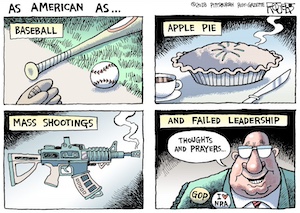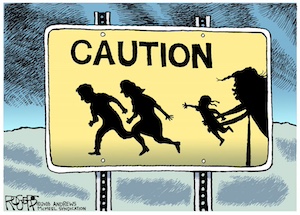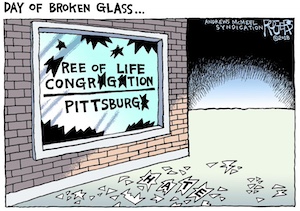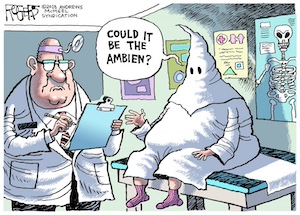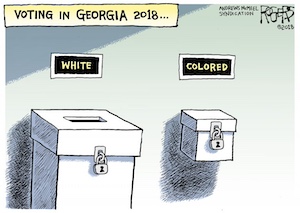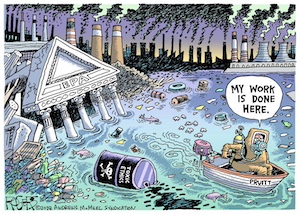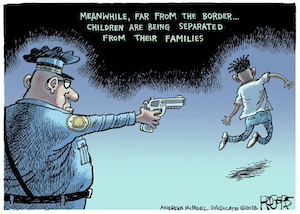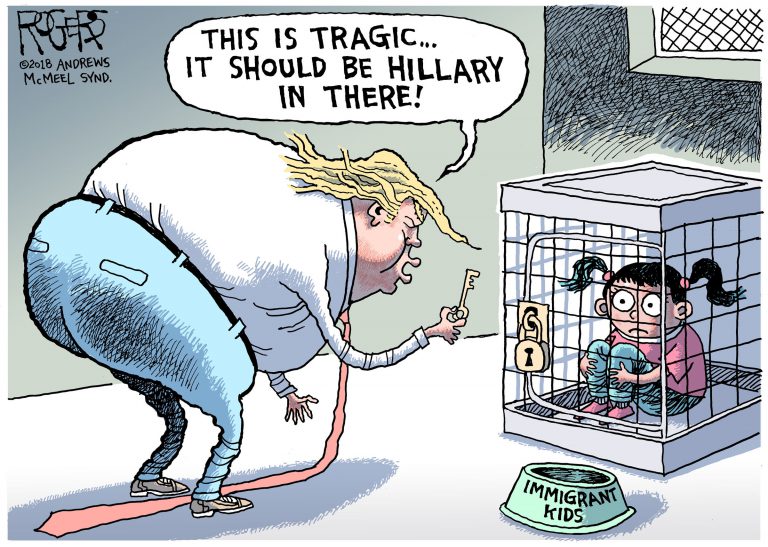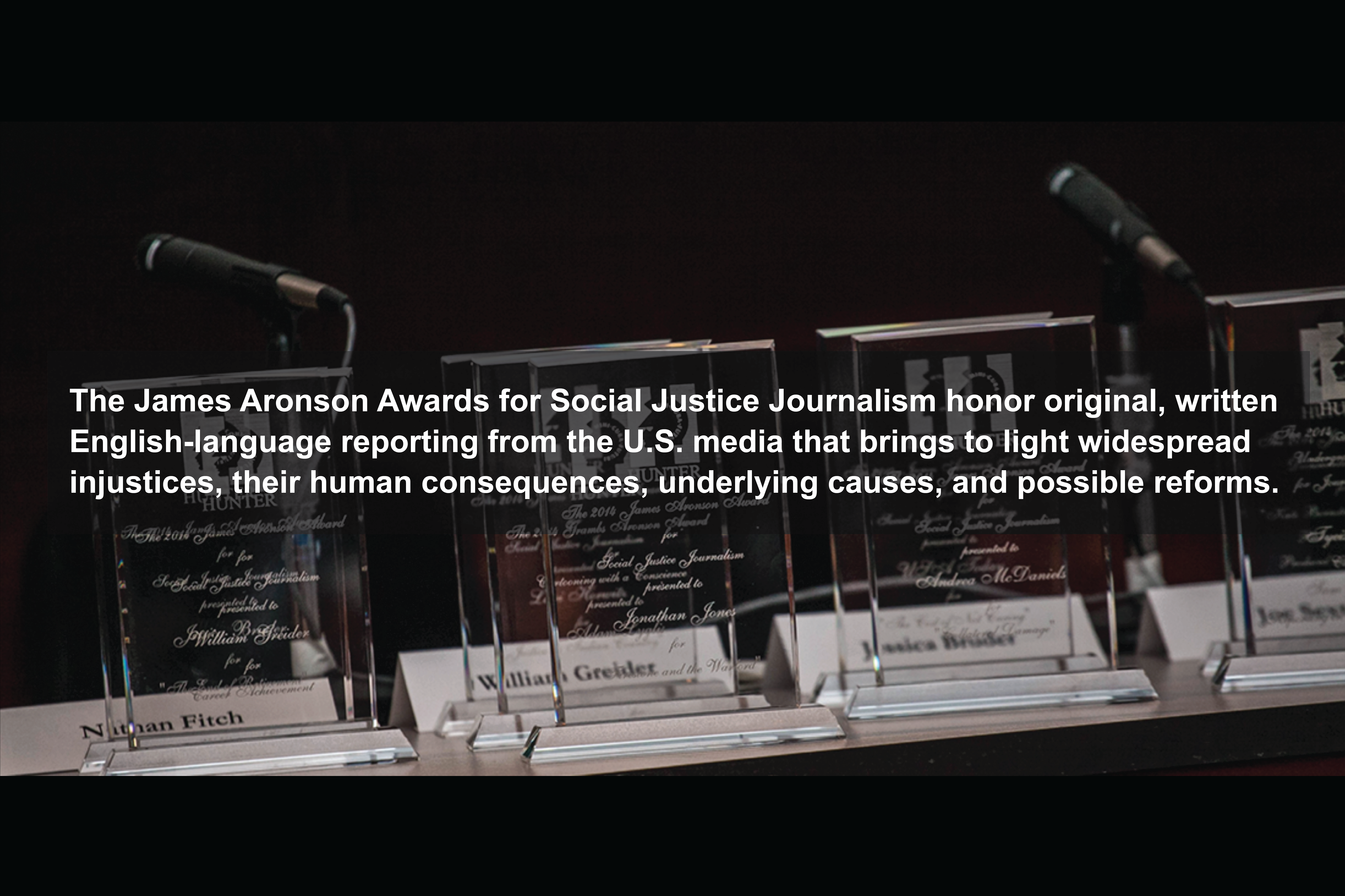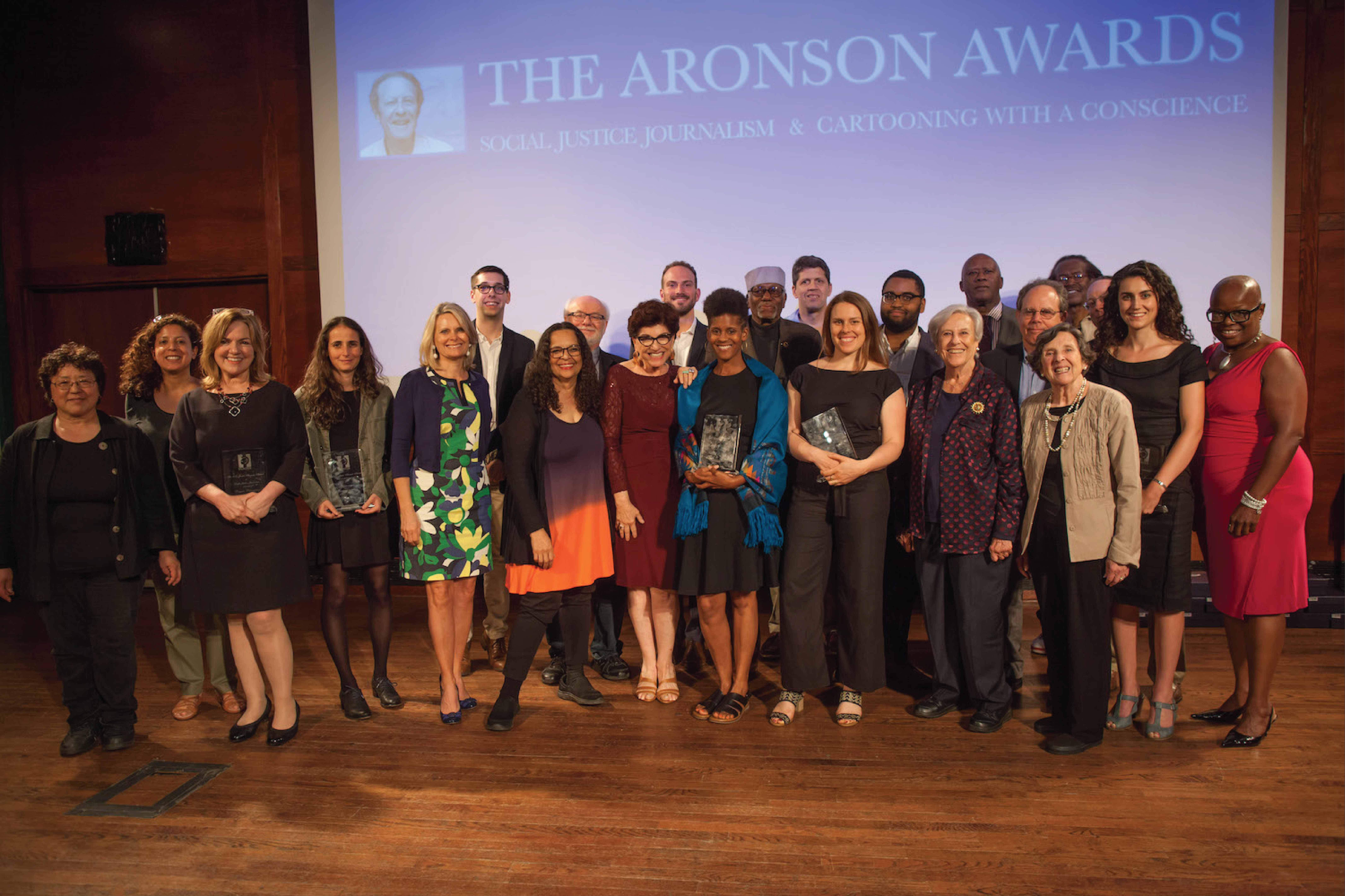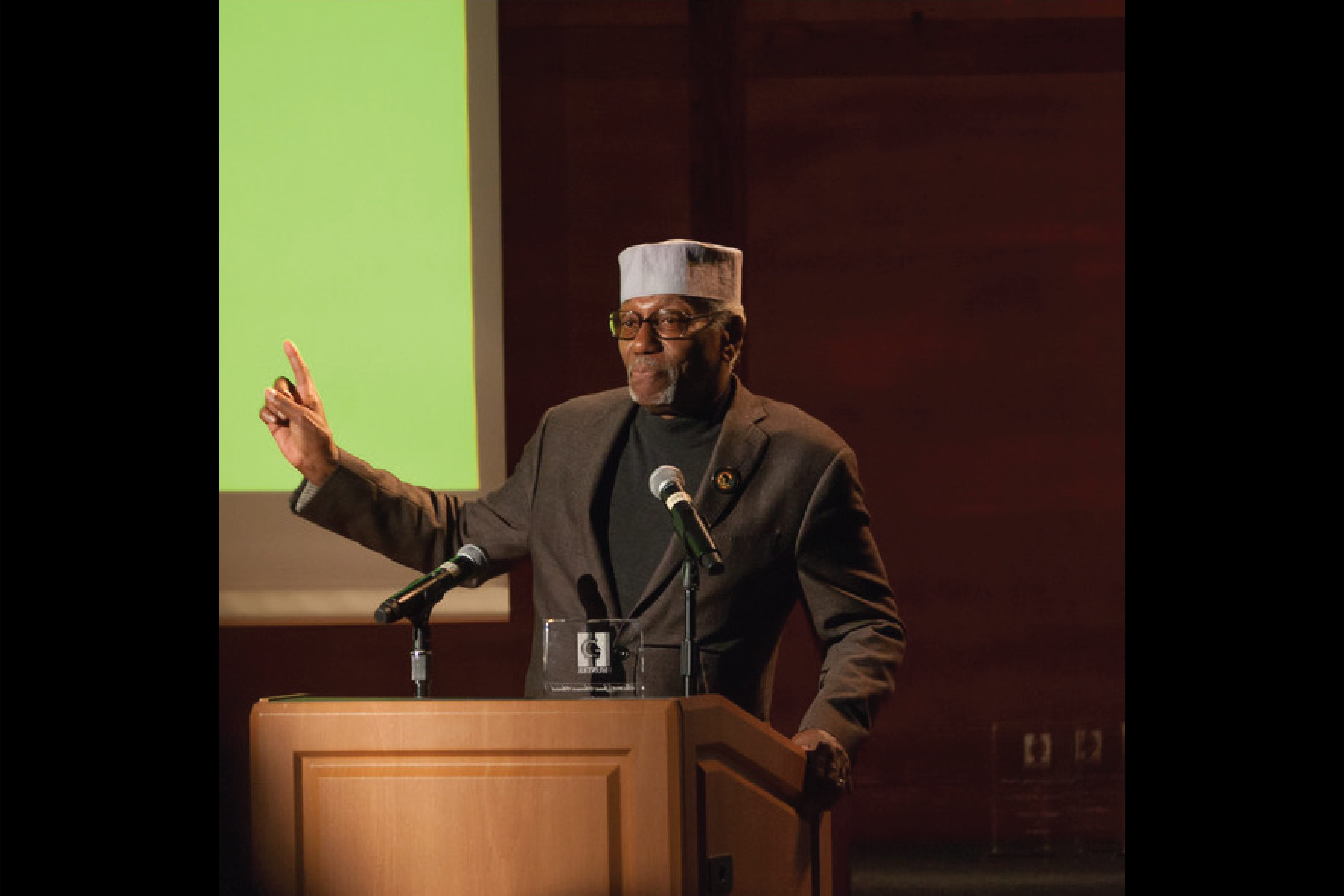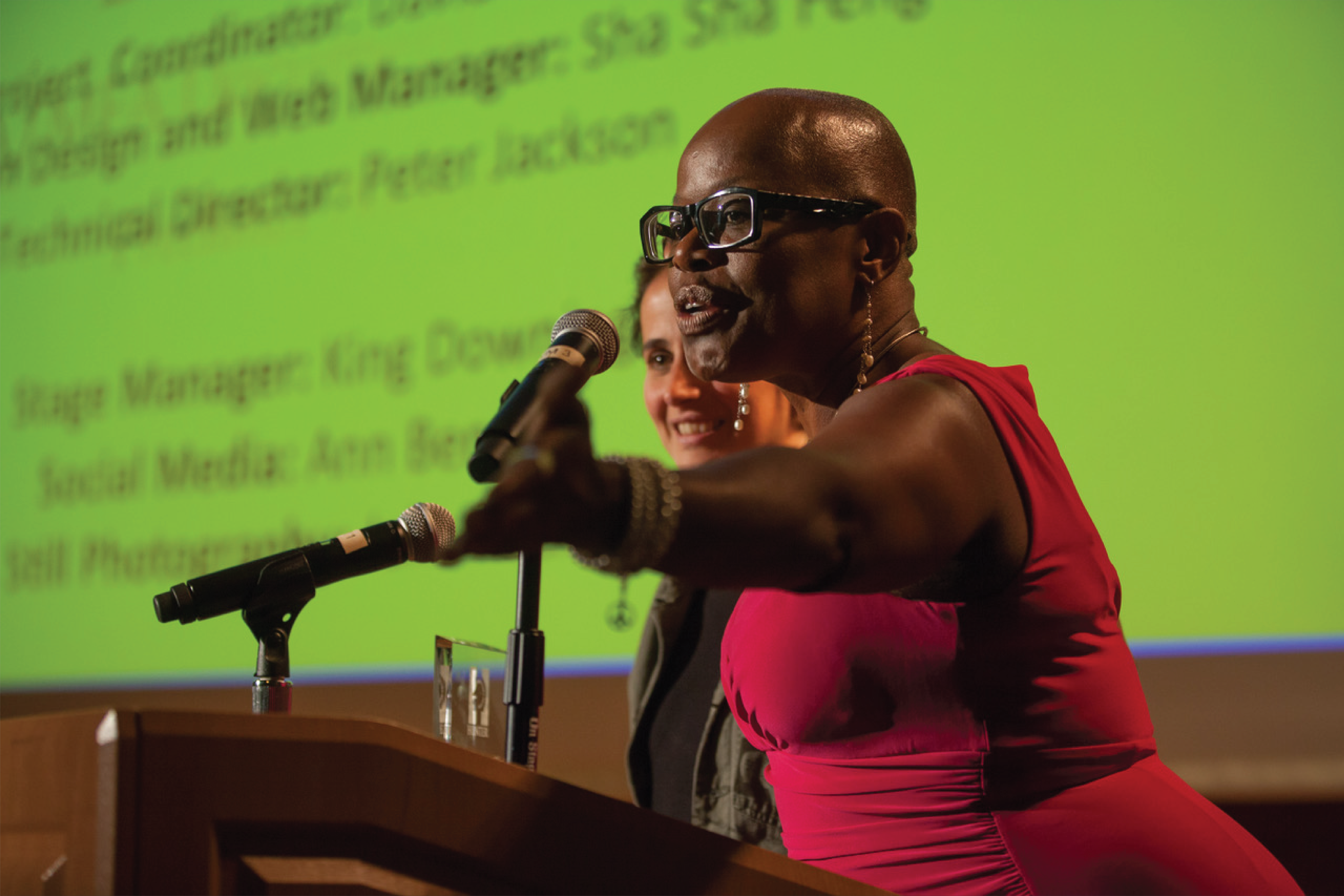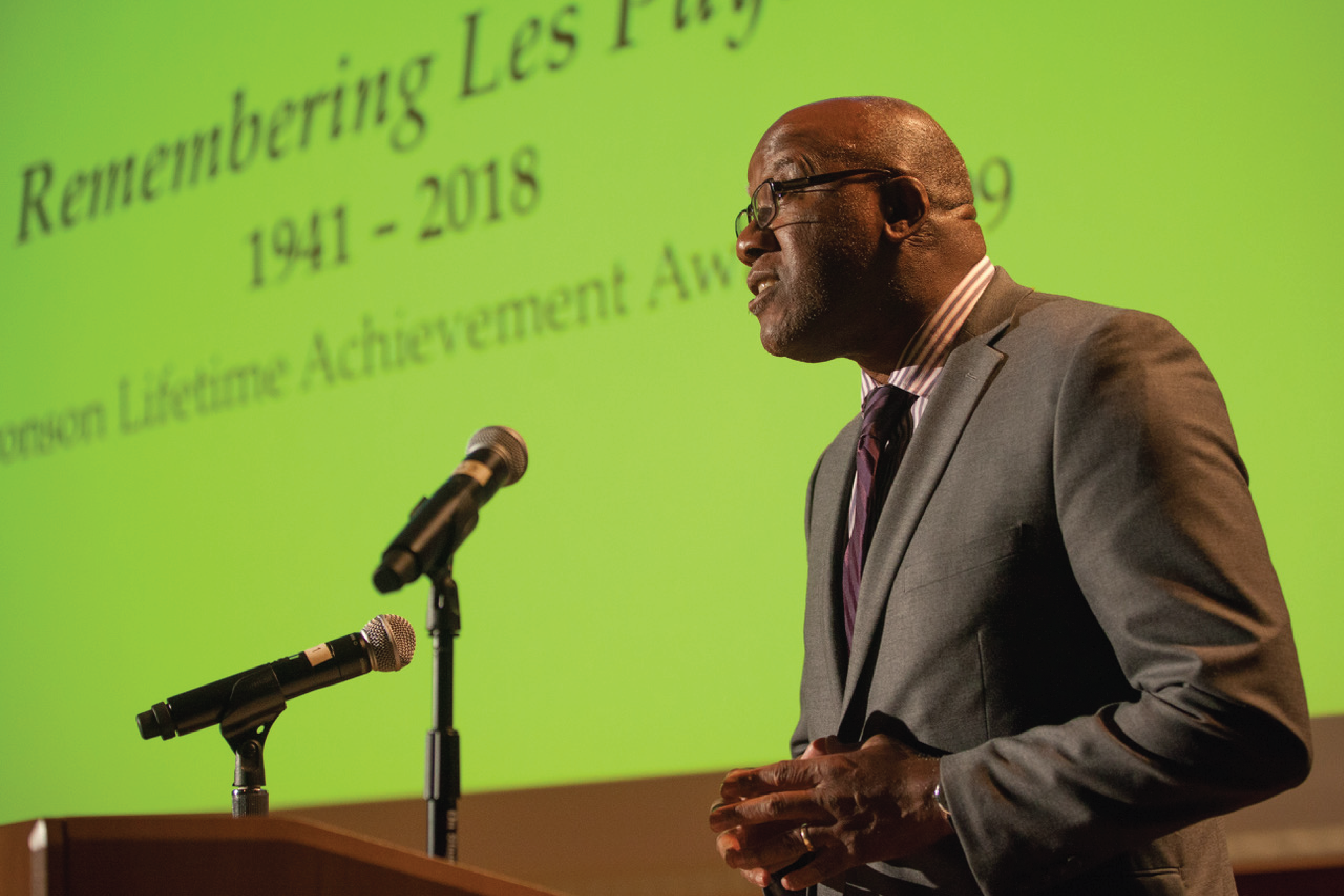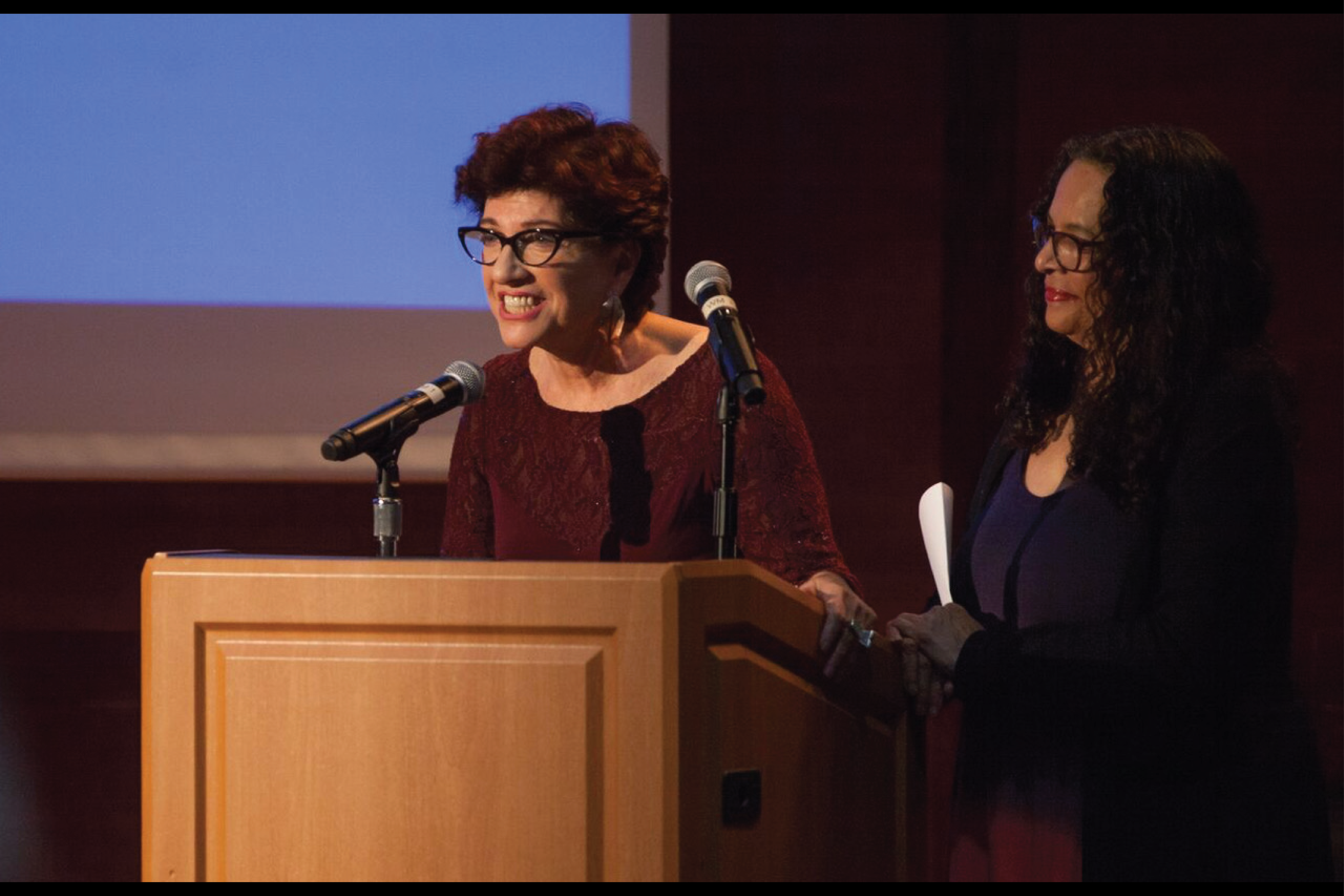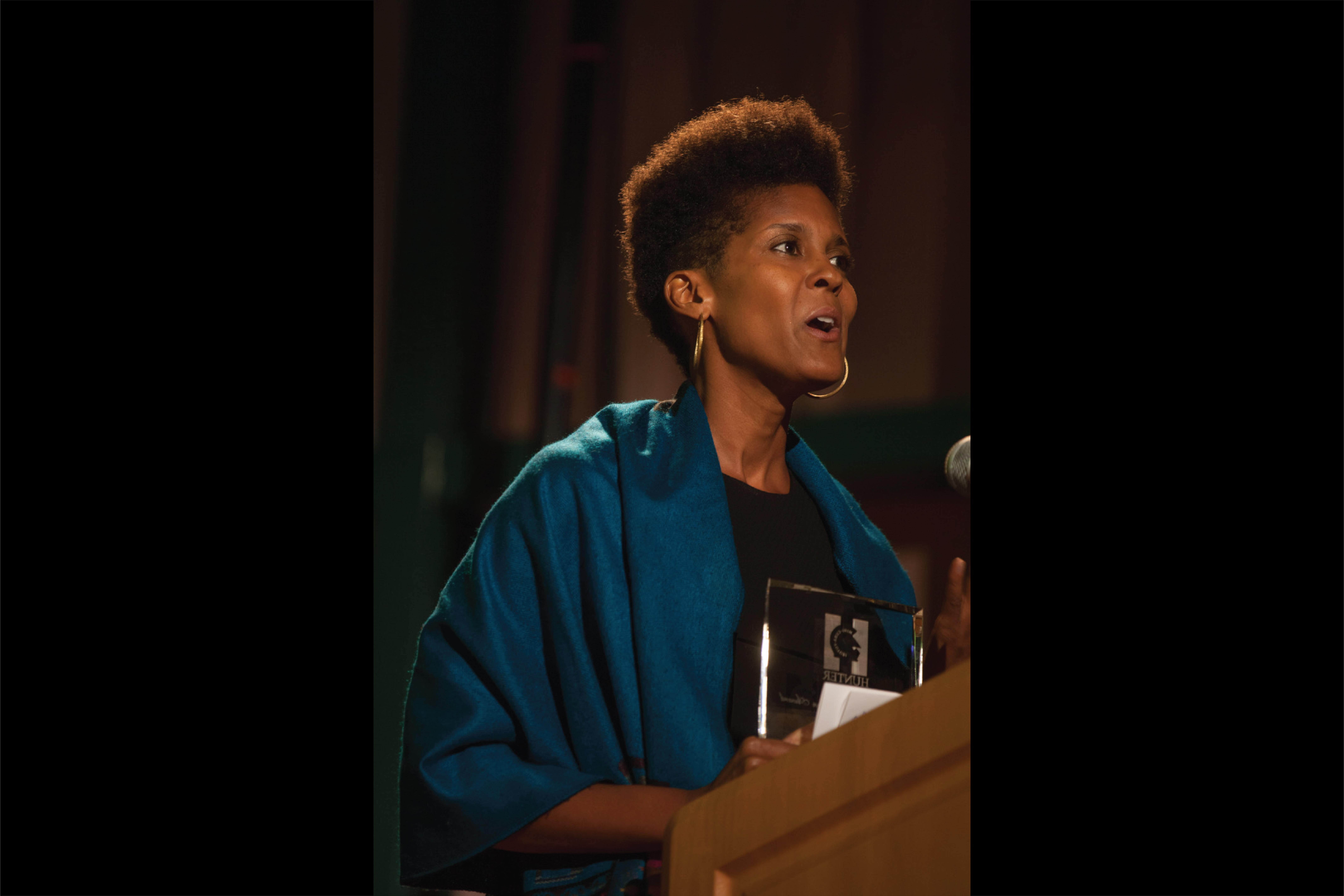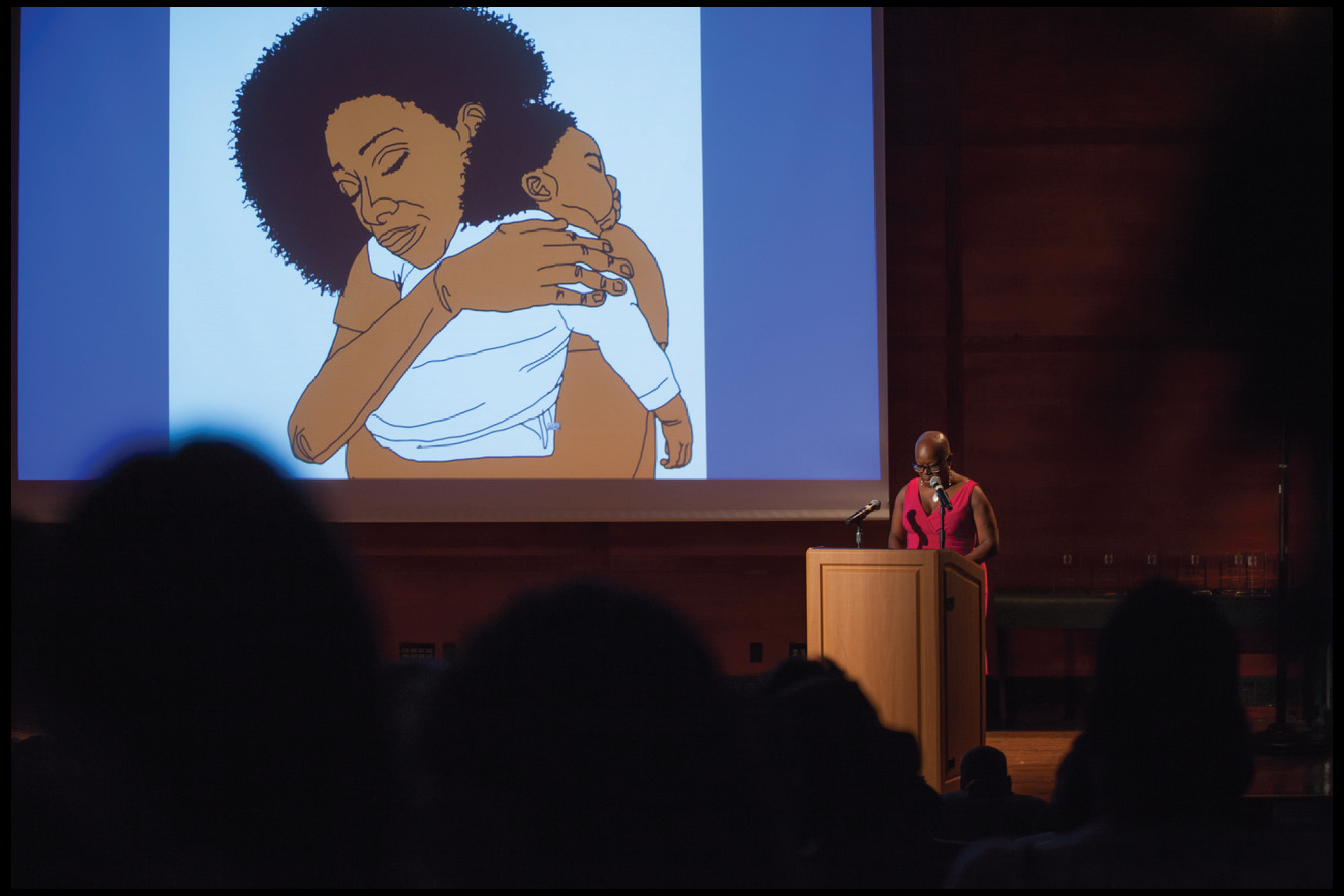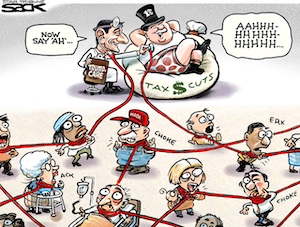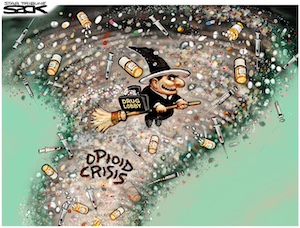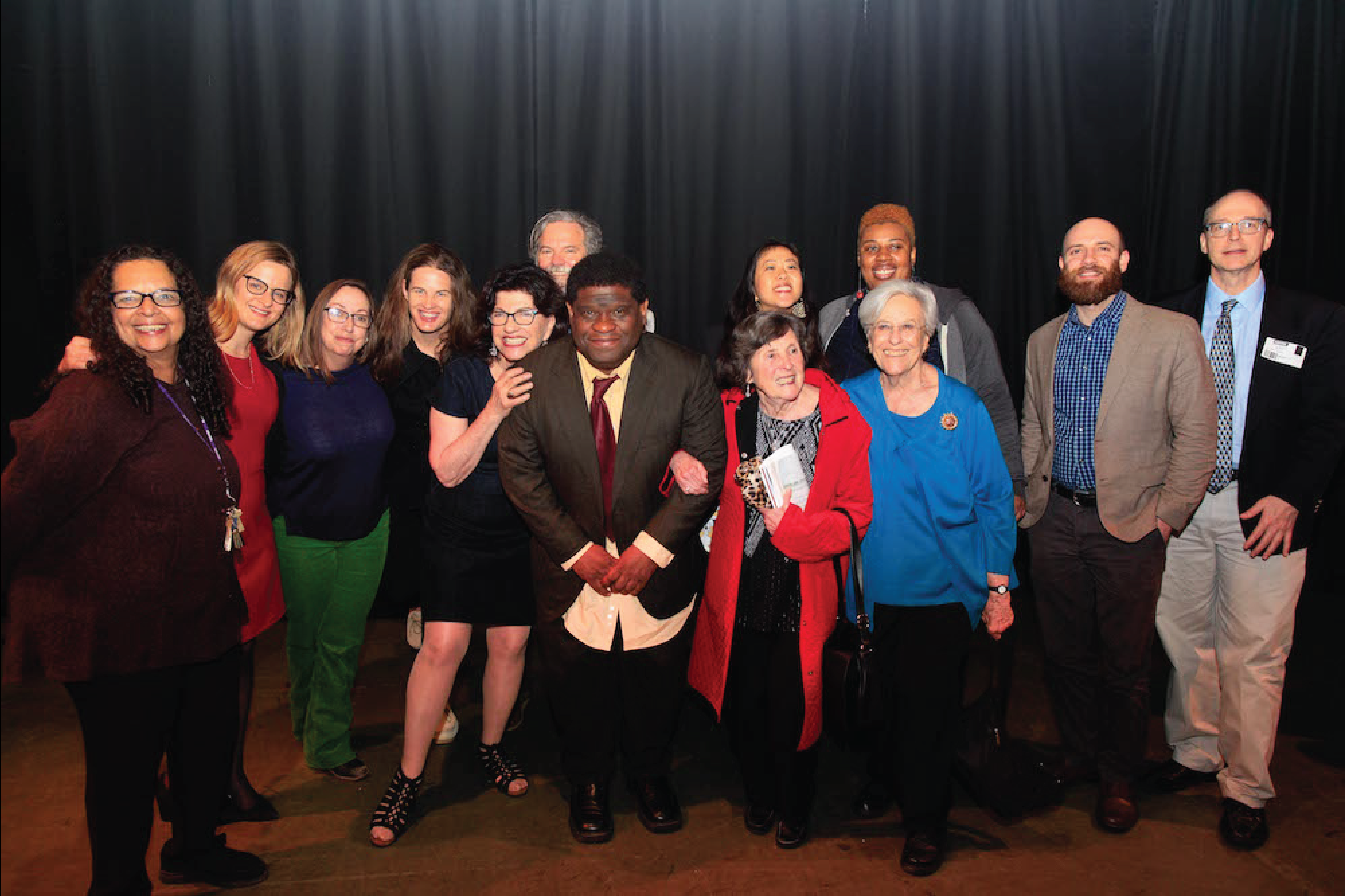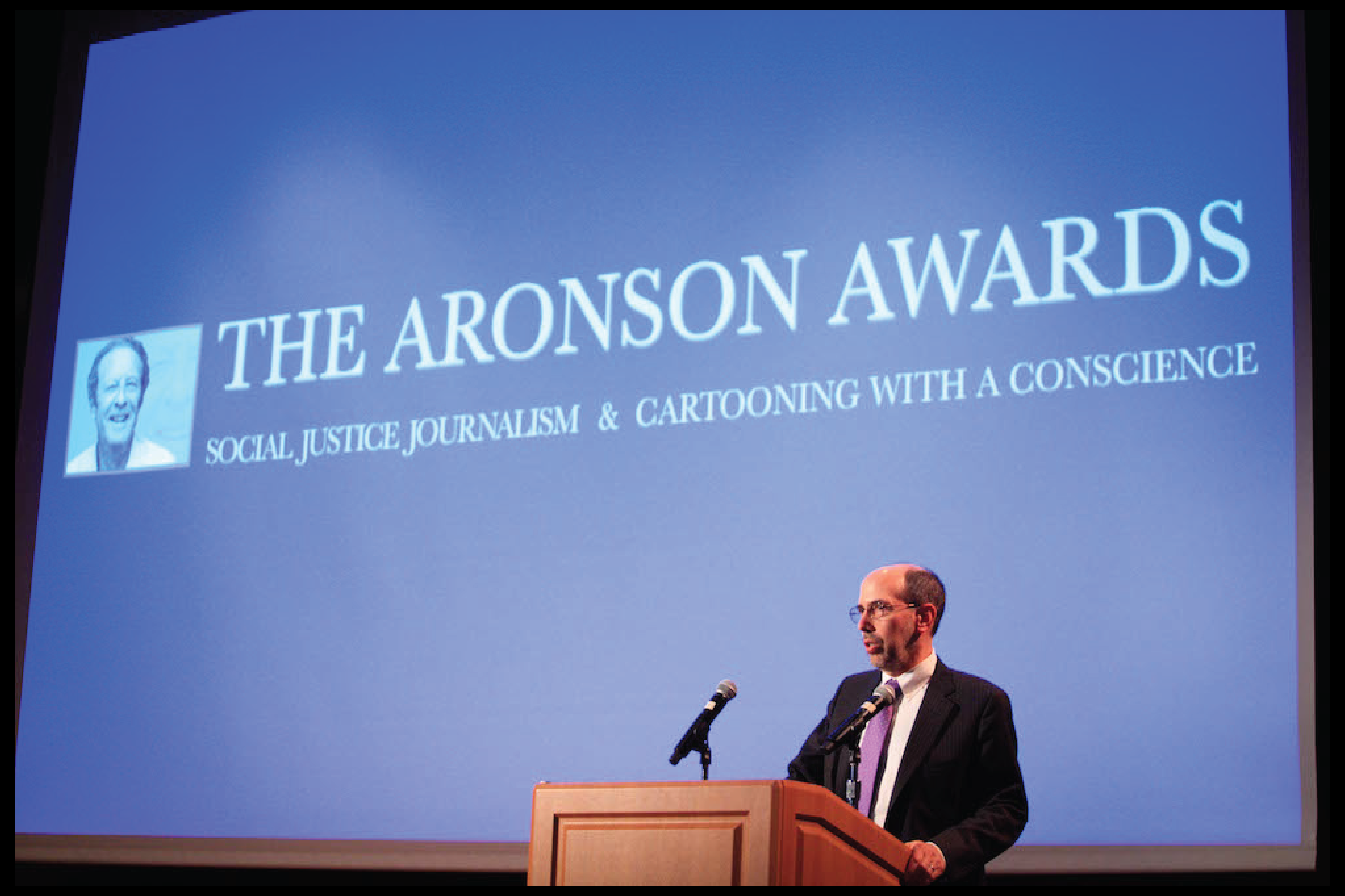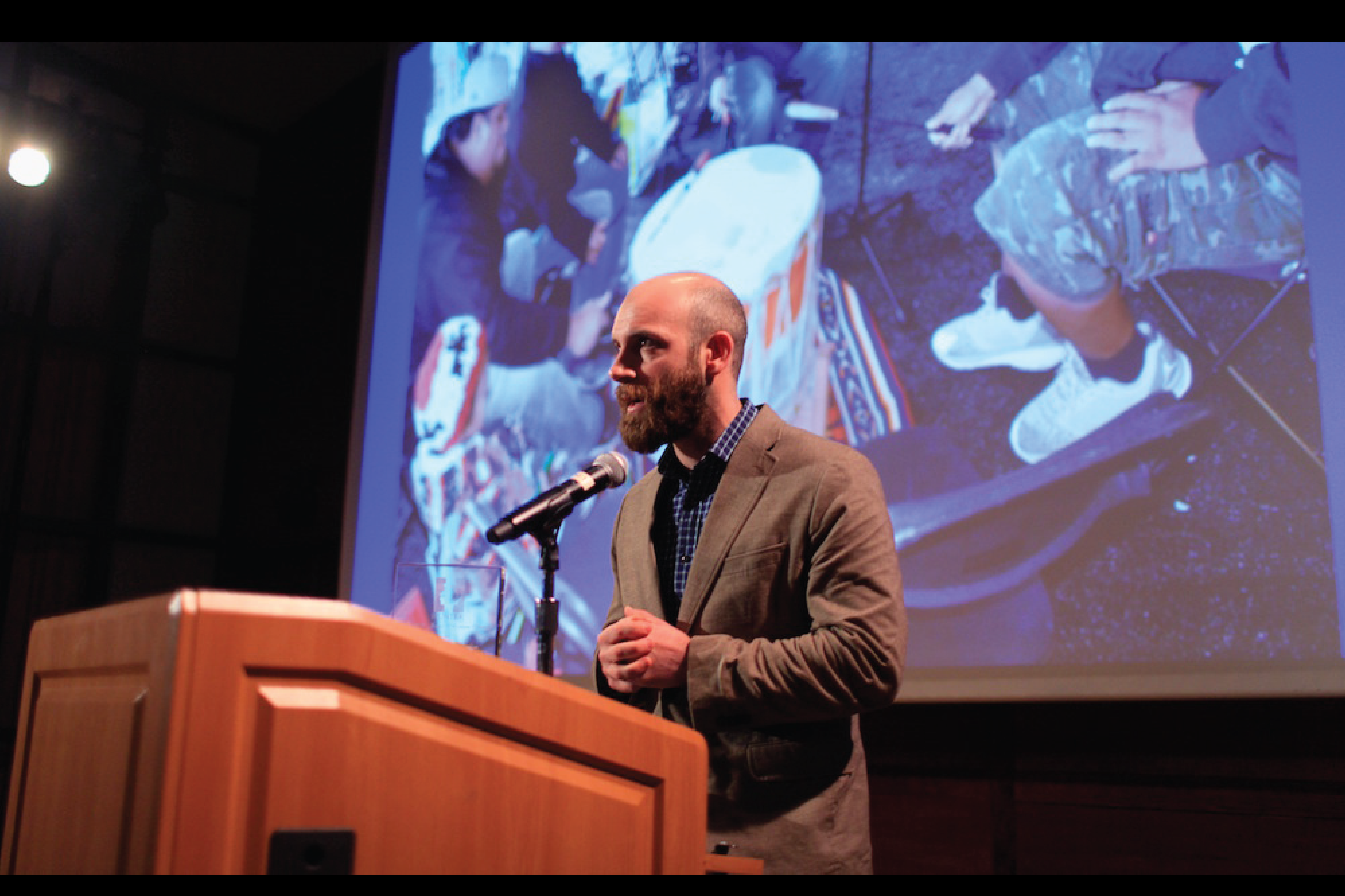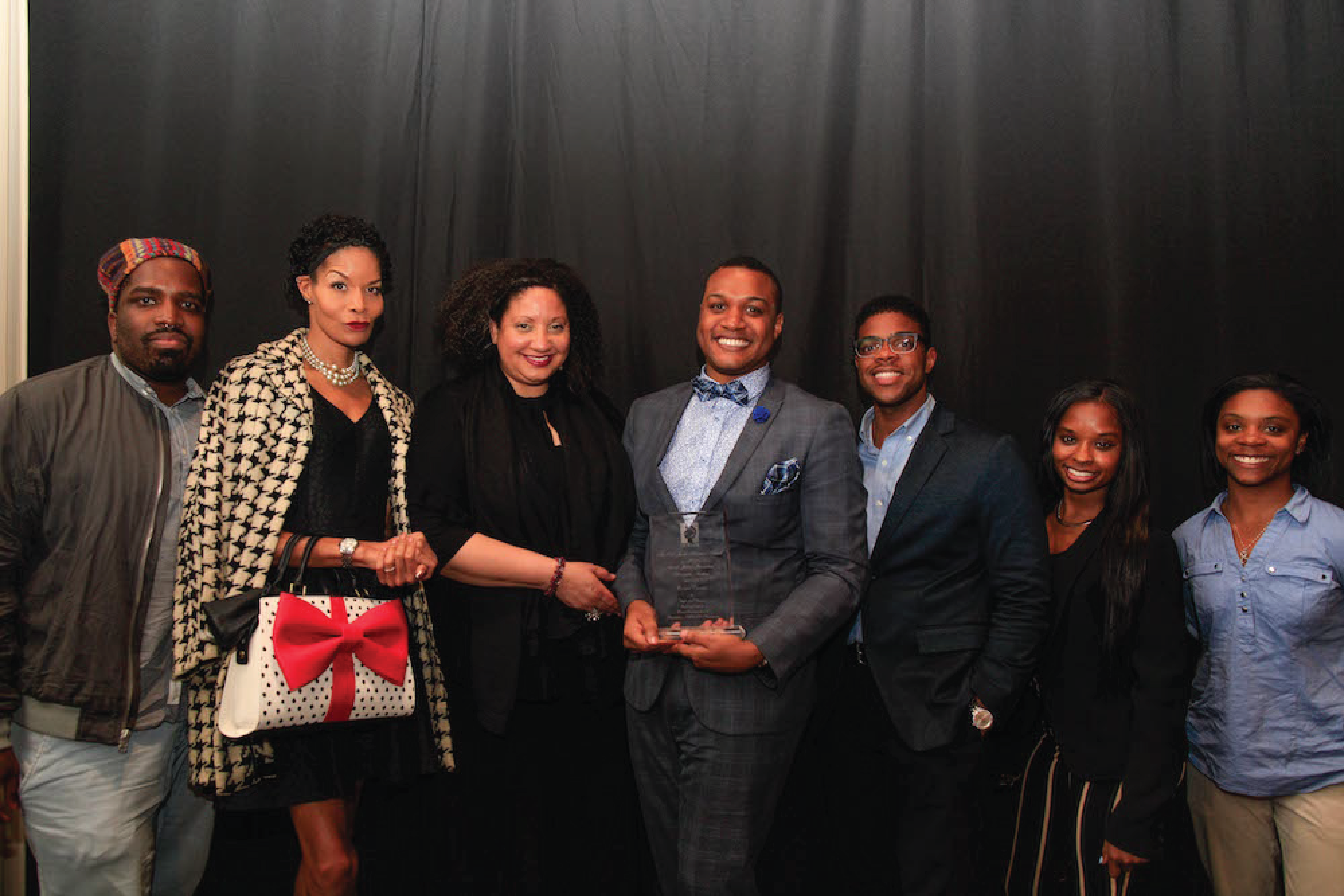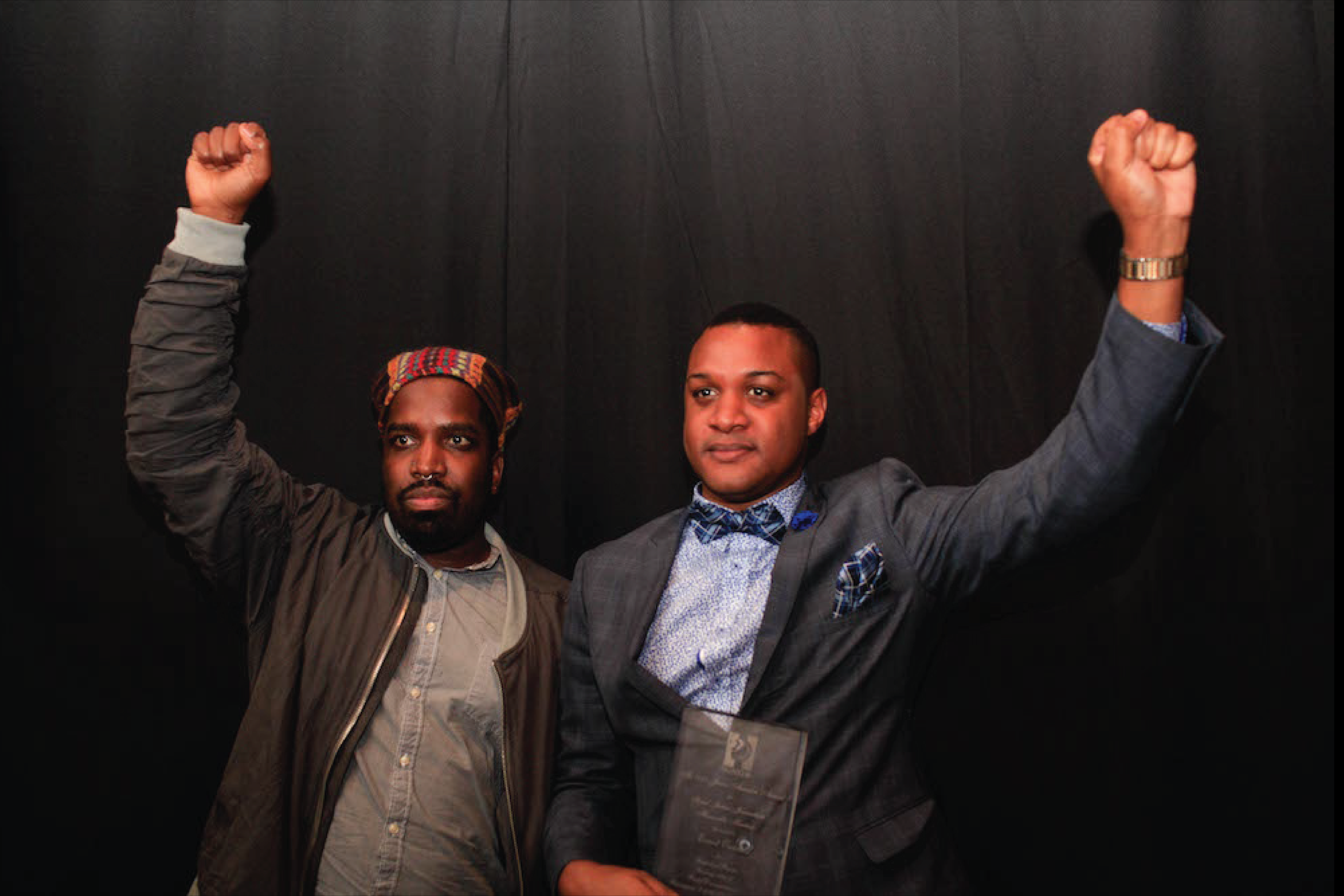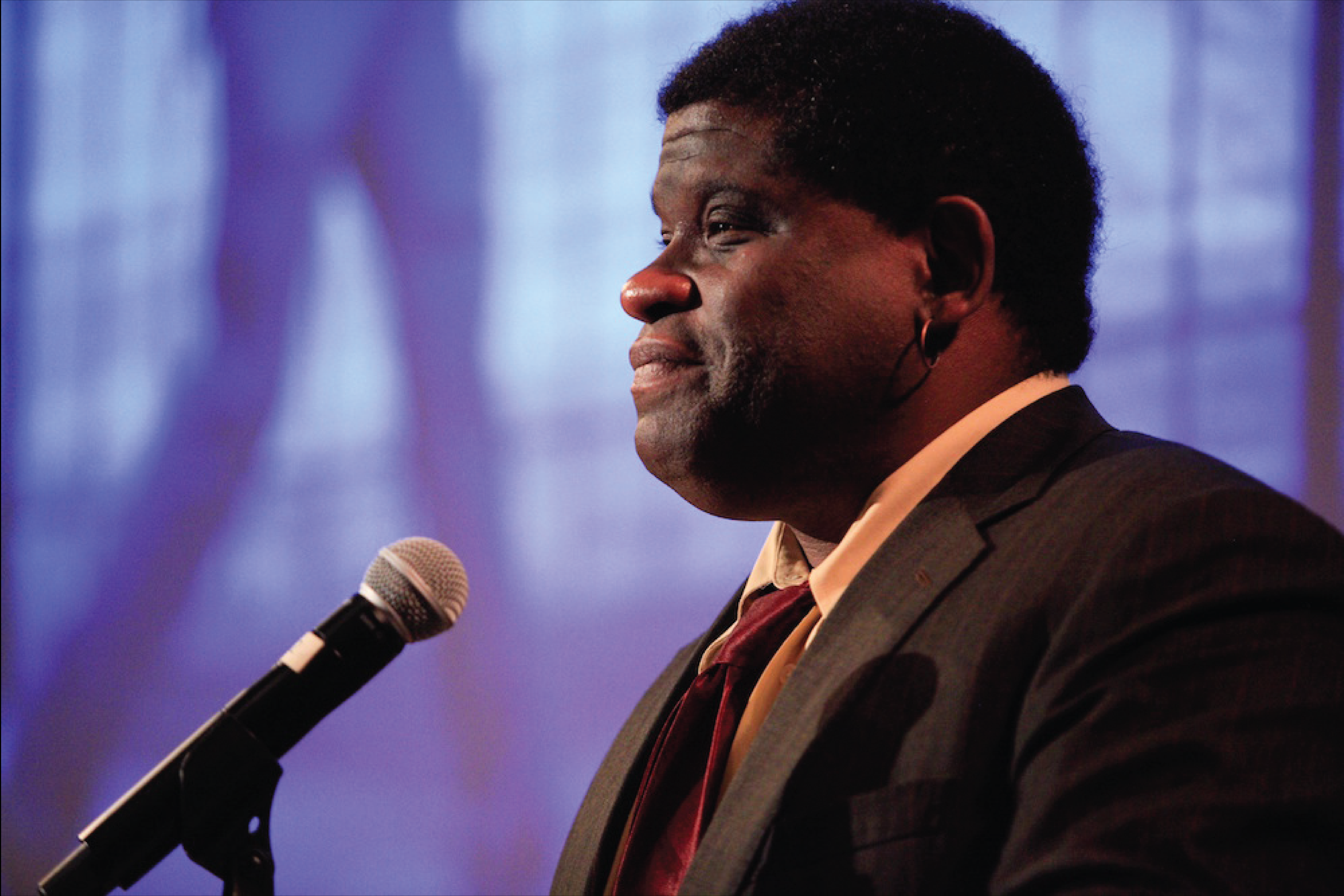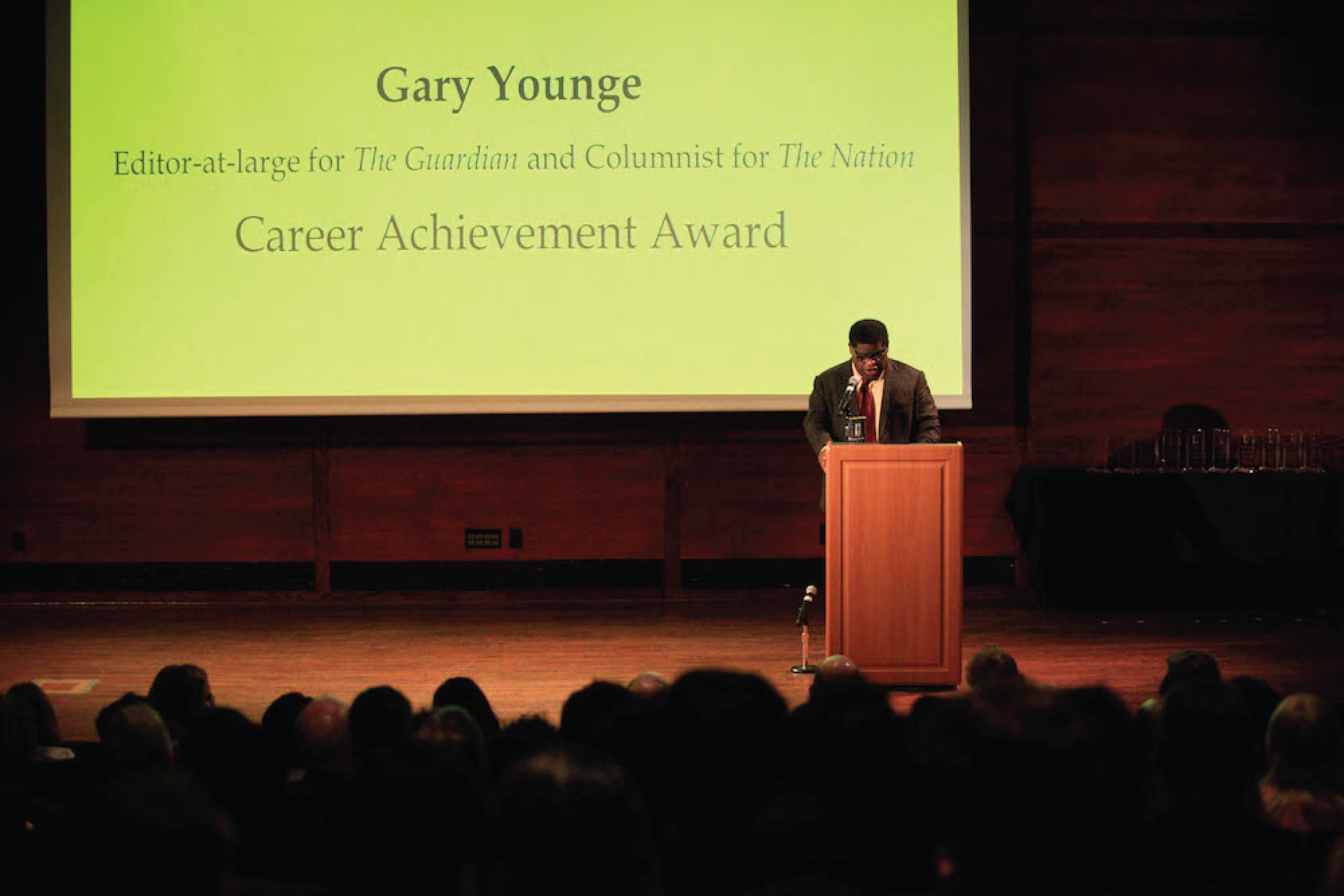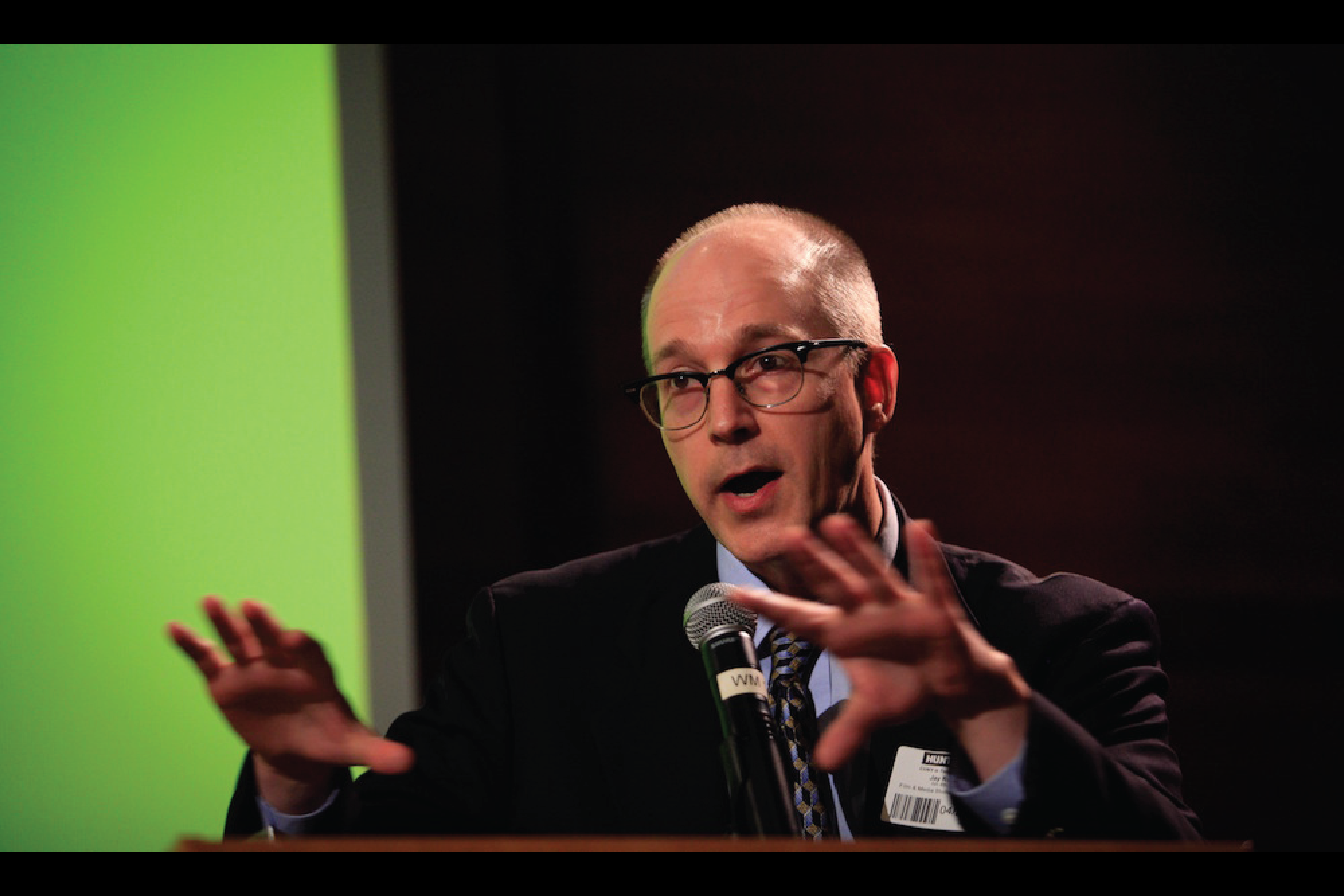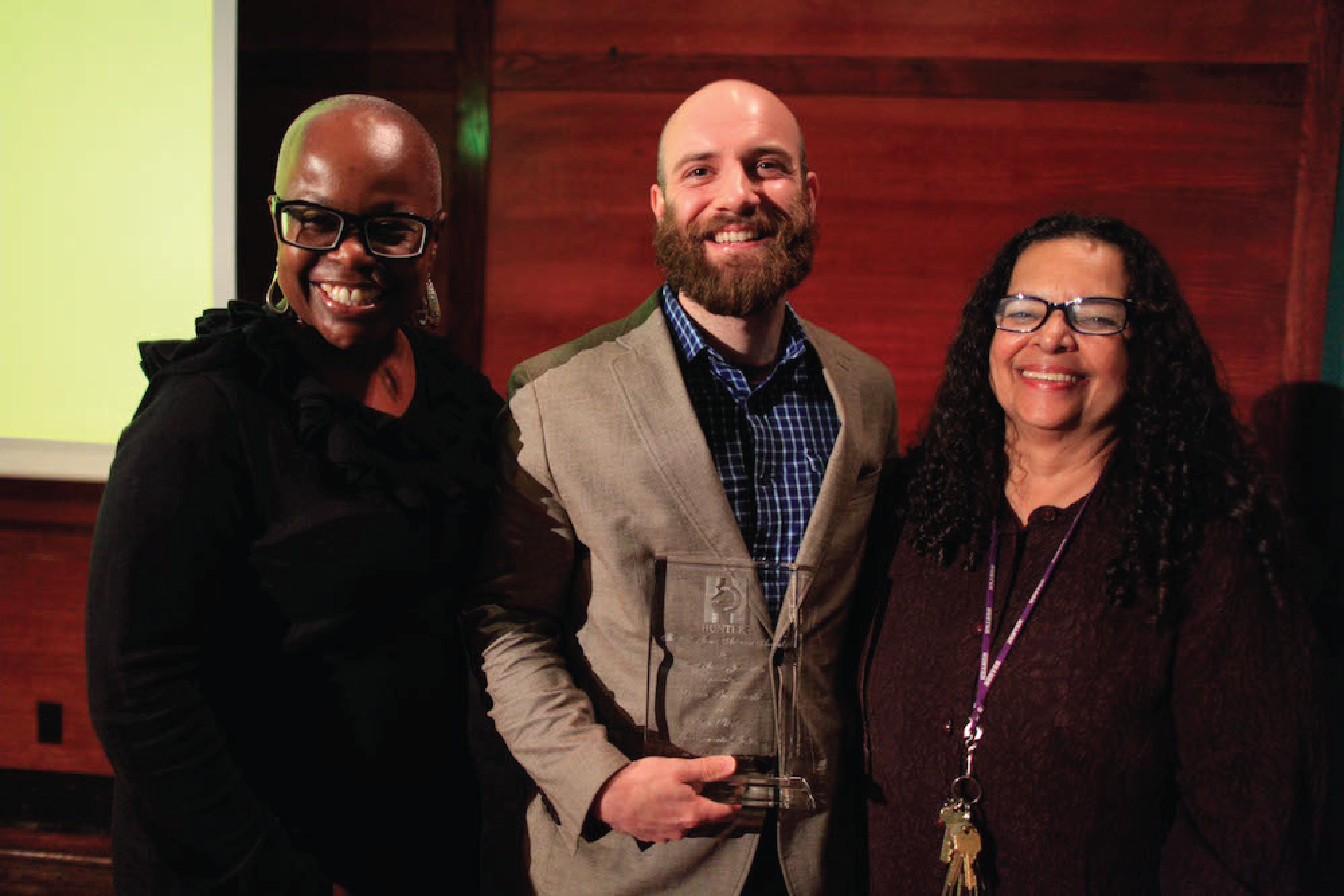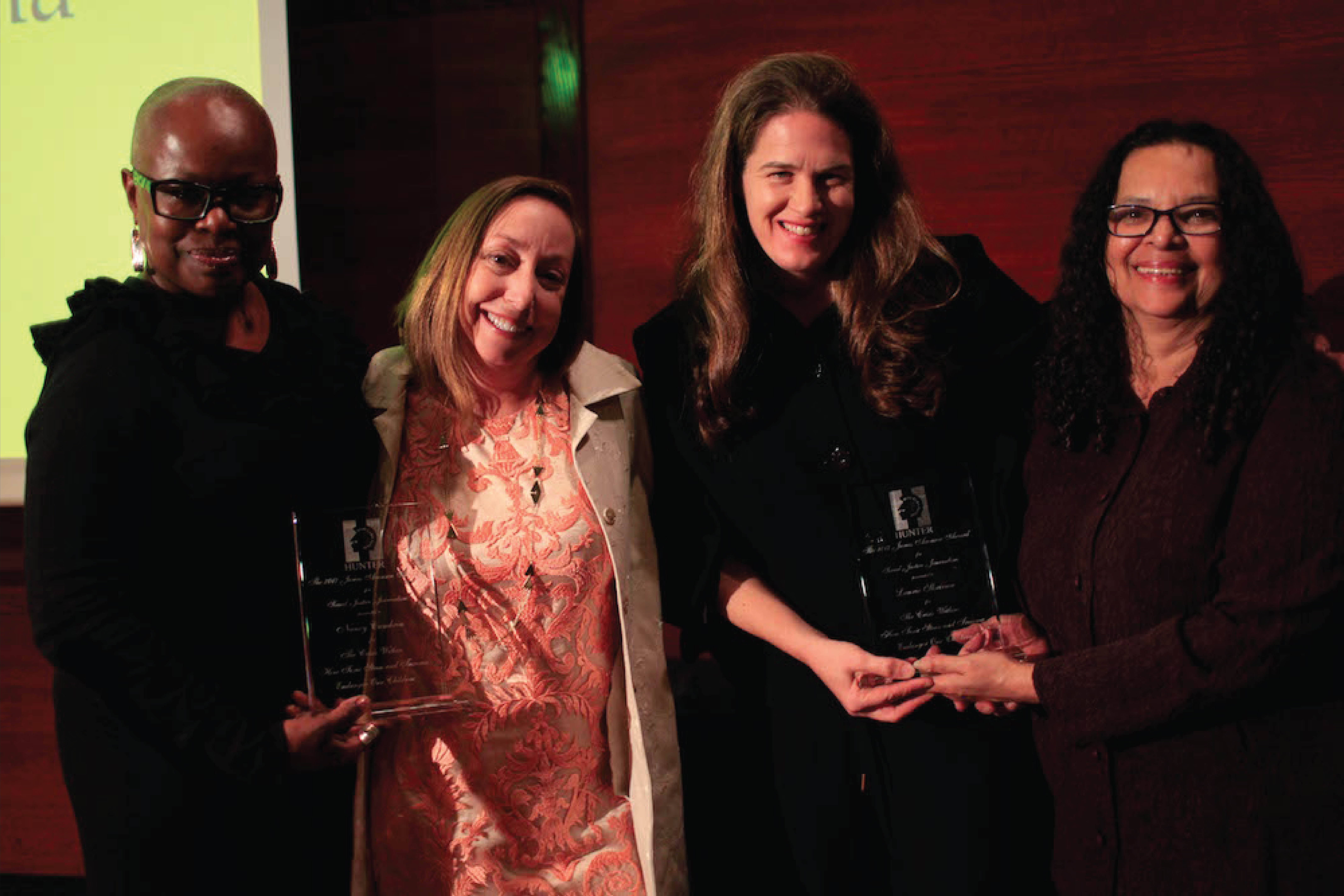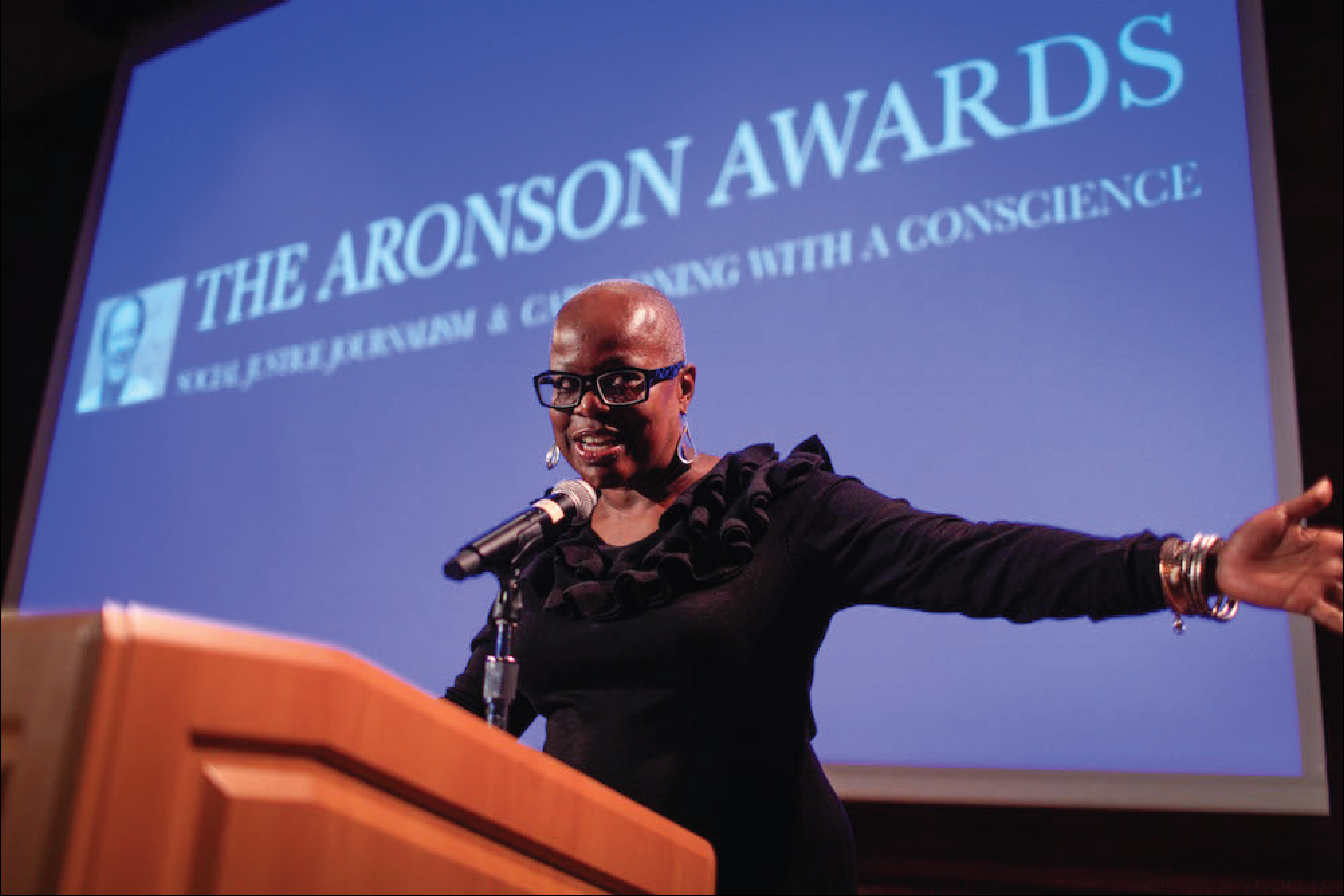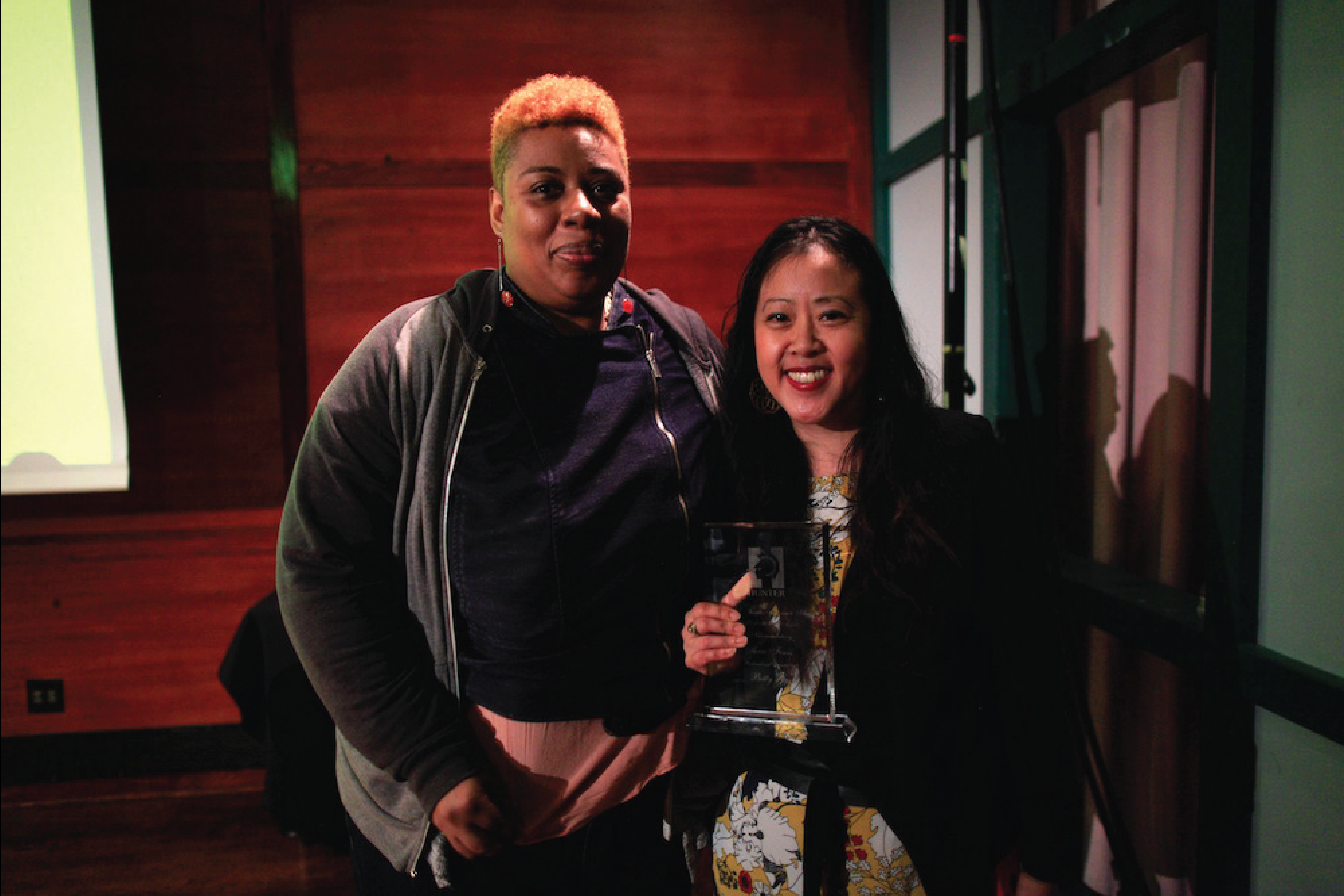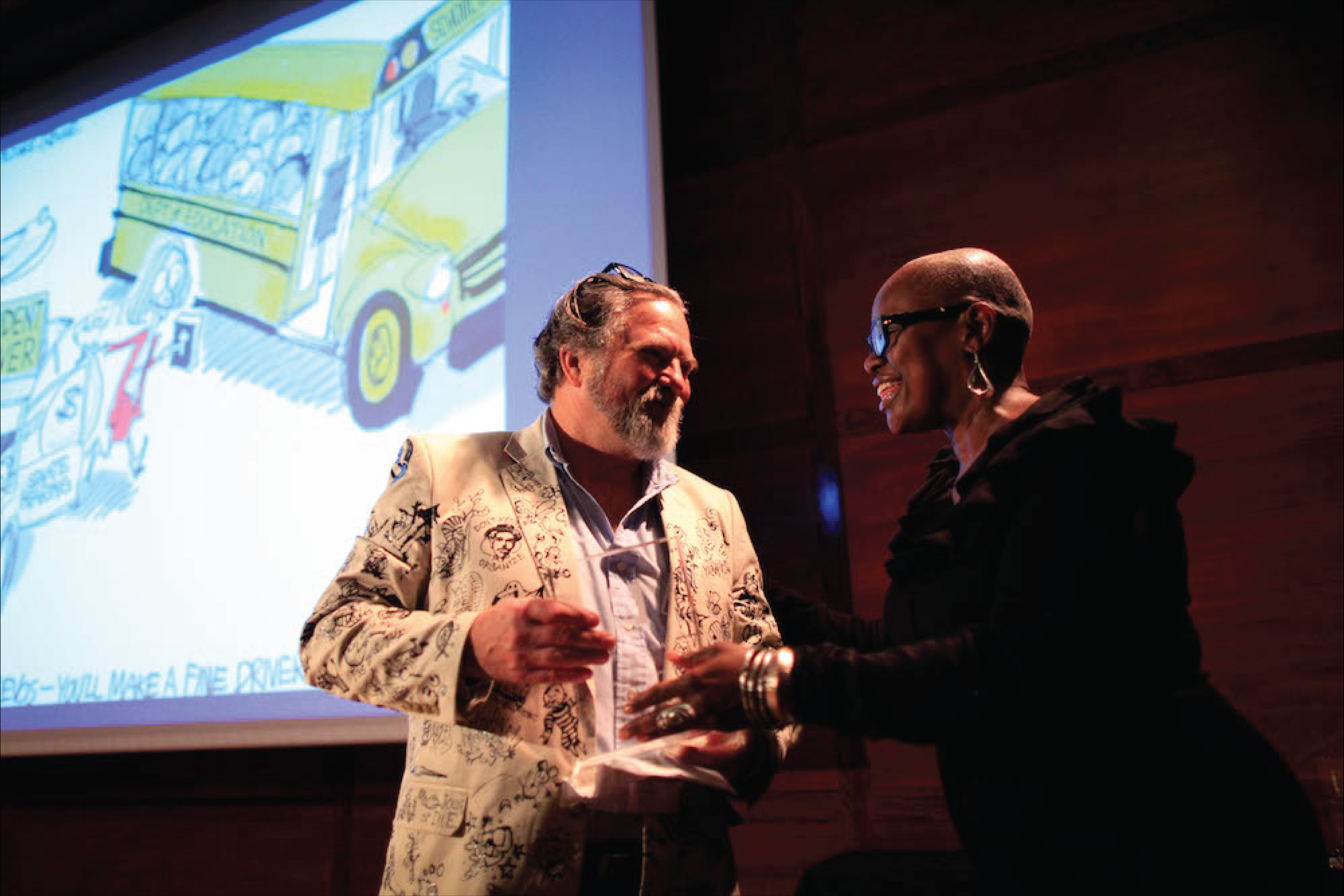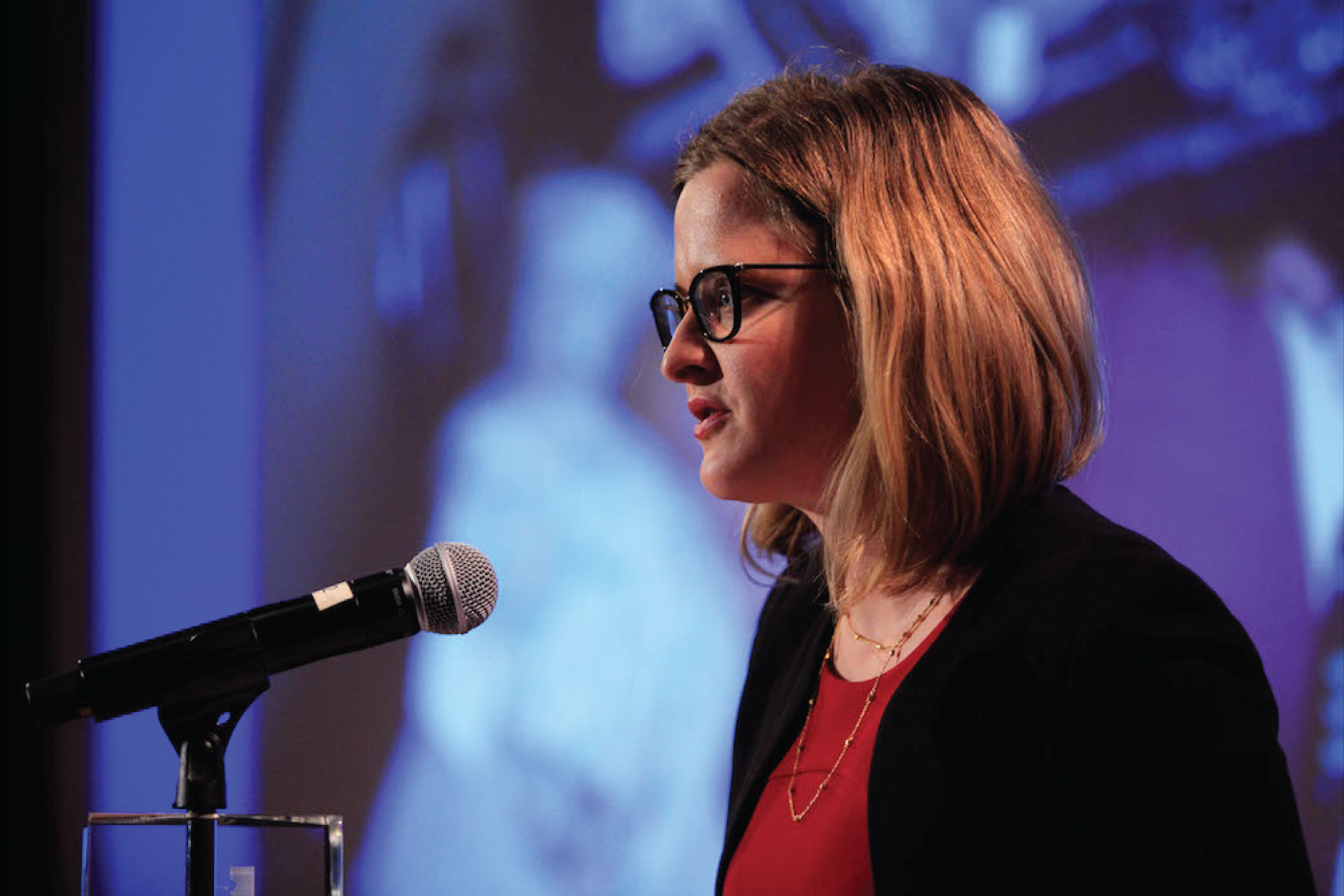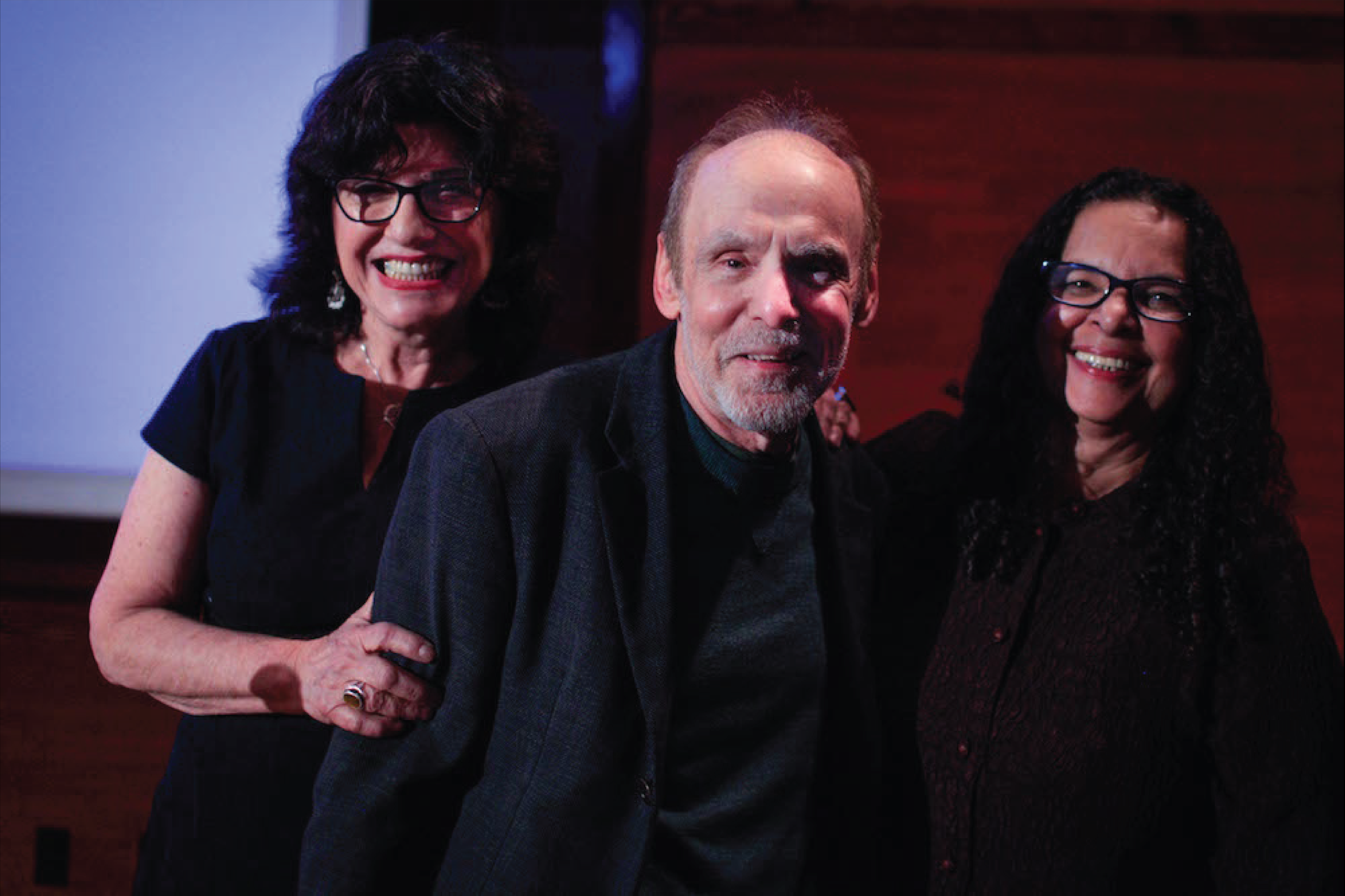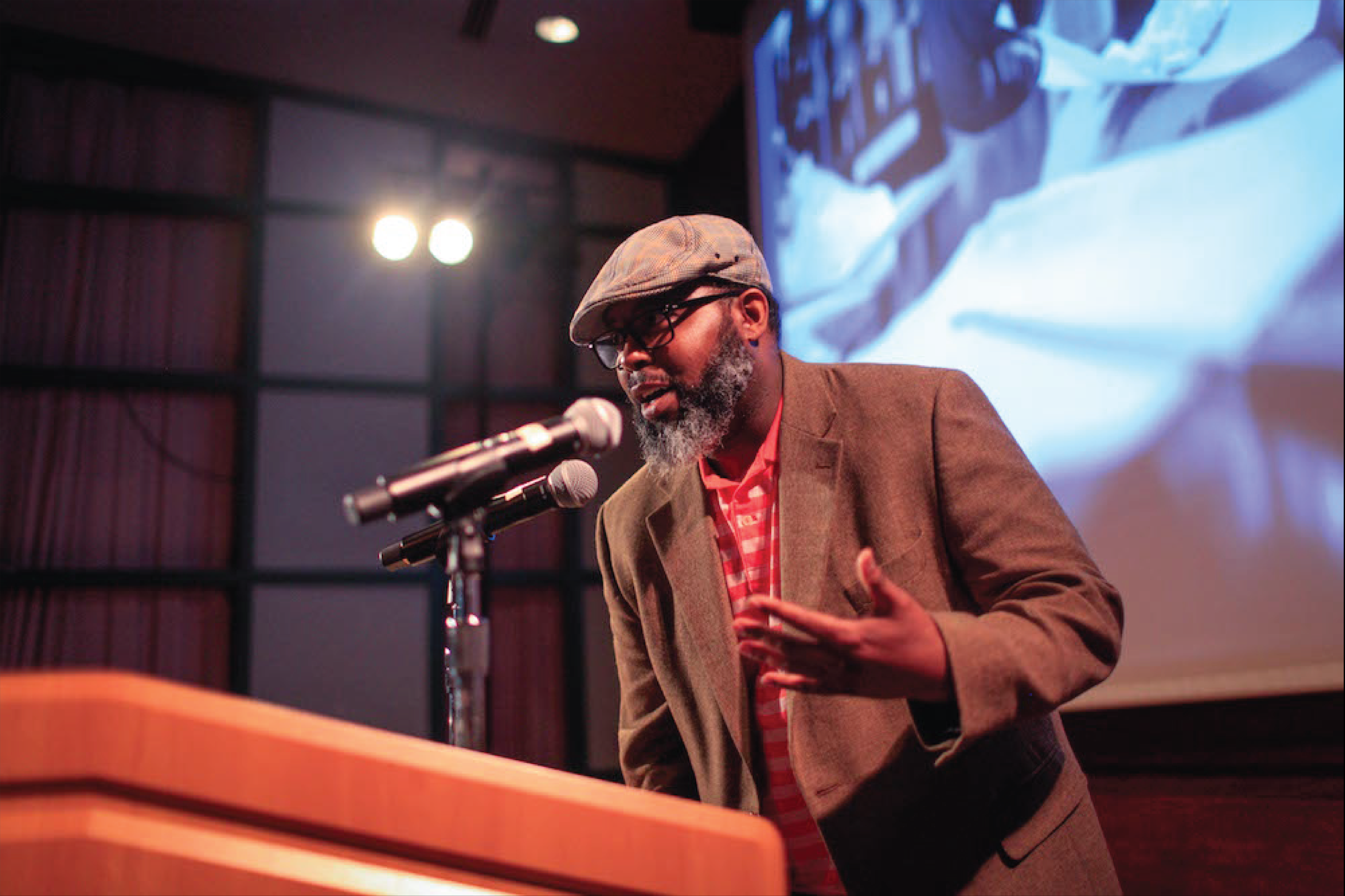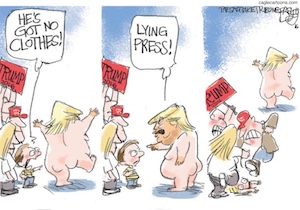2019
Puerto Rico's Center for Investigative Journalism wins Aronson Award for Media in the Public Interest
 Centro de Periodismo
Investigativo (Center for Investigative Journalism)
Centro de Periodismo
Investigativo (Center for Investigative Journalism)
The Aronson Awards proudly recognize the outstanding and groundbreaking work of Puerto Rico’s Centro de Periodismo Investigativo with a special James Aronson Award for Media in the Public Interest for providing in-depth information and analysis vital to the people of Puerto Rico and in the US. As CUNY Chancellor Félix V. Matos Rodríguez noted:
"The James Aronson Awards recognize the best in social justice journalism that informs and thereby empowers the public. Puerto Rico's Centro de Periodismo Investigativo (CPI) proved the value of that work this summer when it obtained, exposed and explained a trove of hurtful comments made by officials at the highest echelons of power on the island. The reports sparked a widespread outcry that resonated across the globe and provoked swift change. I am pleased to acknowledge the critical contributions of the CPI to my homeland at a key point in its history."
Social Justice Journalism Awards
Blowout: Inside America's Energy GambleJamie Smith Hopkins, Jie Jenny Zou, Rachel Leven, Jim Morris, Center for Public Integrity;
Kiah Collier, The Texas Tribune; Michael Biesecker, Tong-hyung Kim, The Associated Press; Zach Toombs, Newsy
Texas is oil and gas country. Behind denials of climate change is a more alarming story. Even as human populations suffer the effects of devastating storms and environmental degradation, this series exposes the doubling down on fossil fuels, this time for export, and with the full participation of the Chamber of Commerce, corporations and the US government. A must read for the environmental movement.
Manhattan Gulag
Aviva Stahl
Gothamist
A provocative and compelling piece, Manhattan Gulag exposes extreme conditions at the Metropolitan Correctional Center (MCC), a pre-trial solitary confinement facility plagued by civil and human rights abuses and violations. These include filthy conditions, vermin infestations, substandard medical care, and violence and abuse at the hands of guards. The reporter spent 18 months investigating life inside MCC’s cells of 17 feet by 8 feet, with no natural light and isolation so extreme that inmates are punished for speaking through the walls. But while the detention center sits just blocks from City Hall and Wall Street, only few people knew that a gulag exists right in the heart of Lower Manhattan.
Shocked and Humiliated
Susan Ferriss
Center for Public Integrity, in collaboration with The Washington Post
This outstanding investigation reveals how federal agents at US airports, border crossings and immigration detention centers used vaginal probing, shackling, handcuffing, and hours-long interrogations as federal officers scrutinized people in search of hidden drugs. In a profound and direct style of reporting, Ferriss uncovered and documented 11 invasive-search legal claims, and her reporting revealed that six had resulted in government settlements with victims totaling more than $1.2 million in payments.
Toxic City, Sick Schools
Barbara Laker, Wendy Ruderman, and Dylan Purcell
Photos and video by Jessica Griffin
The Philadelphia Inquirer
The reporters document 9,000 environmental problems in Philadelphia’s public schools, thanks to dogged reporting and interviews with more than 120 teachers, parents, students and experts. The parents’ stories about their children were compelling, heartbreaking and unassailable. The story changed the public dialogue and led to significant reforms and funding that affected tens of thousands of children.
Honorable Mention
Cultivating a CommunityJames E. Causey
Angela Peterson, photogragher
Milwaukee Journal Sentinel
Forty-five percent of the residents in Milwaukee’s 53206 ZIP code live below the poverty line; nearly 4,000 of its men are or have been in prison. Andre Lee Ellis has spent the last 5 years on this battlefield. His weapons are fruits and vegetables, mentorship and love. “We Got This” is a community garden where 58 year-old Mr. Ellis mentors endangered black boys, ages 12 to 17. This is also where the reporter grew up and, in journal entries, he reflects on reporting from a place he once called home.
Father. Son. Cellmates.
Samantha Melamed
The Philadelphia Inquirer
Set in Pennsylvania’s prison system, “Father. Son. Cellmates.” has tremendous narrative power as you meet the fathers and sons who share the same prison cell and gradually learn how they came to be who they are and where they are. This feature story required tremendous reporting diligence to both navigate prison bureaucracies and win the trust of the prisoners themselves and get them to open up about their lives. At a time when efforts are growing to scale back or abolish entirely the U.S. system of mass incarceration, Melamed helps us better understand how that system continues from one generation to the next.
Grambs Aronson Cartooning with a Conscience Award
Rob Rogers is the 2019 recipient of the Cartooning with a Conscience Award for the range of his work, unique artistry, and poignant social justice commentary. After 25 years as the award-winning editorial cartoonist for the Pittsburgh Post-Gazette, Rob Rogers was fired in June of 2018 for drawing cartoons critical of President Trump. Rather than bow to pressure from management to soften his criticism of Trump, Rogers risked his livelihood to maintain his integrity. Cartooning with a Conscience indeed!
Undergraduate Journalism Winner
Maria Luisa Imbachi is a senior at Hunter College majoring in media studies with a concentration in journalism. Born in Colombia and raised in East-Elmhurst, Queens, Maria Luisa was a staff writer for The Athenian, covering sustainability and immigration issues. Her multimedia stories about Dreamers offer a unique insight into people who have an opinion but often no voice and her stories on the environment help students understand the importance of sustainability.
Finalists
Checkpoint NationMelissa del Bosque
The Texas Observer
Peter Gosselin, Ariana Tobin, and Ranjani Chakraborty
Pro Publica / Co-published with Mother Jones
Naomi Ishisaka
Crosscut in partnership with Seattle Magazine
Ian James and Zoe Meyers
The Desert Sun / USA Today
Johnny Magdaleno
Next City
Naveena Sadasivam
The Texas Observer
Coonor Sheets
Alabama Media Group
Justine van der Leun
VQR in partnership with Type Investigations
The Weather Channel Digital
2018
Herb Boyd, Keynote and Outstanding Career Achievement Award
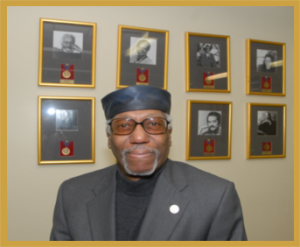
Herb Boyd
Herb Boyd is a recognized journalist, historian, activist, and author of 23 books.
His award-winning books give profound meaning to the Black experience in American life,
from We Shall Overcome: A History of the Civil Rights Movement, Black Panthers for Beginnersto
biographies of James Baldwin, Sugar Ray Robinson and others. This year his profile has
catapulted even further with the release of his latest book, Black Detroit: A People’s
History of Self Determination. Part memoir, part love letter, part historical chronicle,
Boyd shares his reflections on this iconic American city and explains in detail the significant
contributions African Americans have made to Detroit and Detroit to the nation.
Social Justice Journalism Awards
Sold for Parts, Michael Grabell and Howard Berkes
ProPublica and NPR
A riveting series about the duplicity of American companies like Case Farms in Ohio and insurance companies in Florida who recruit undocumented workers and then report them to immigration when they are injured or attempt to organize. The writers travel to Tectitán, a Mayan village in Guatemala, where Case Farms is a familiar reference. Through first person accounts they tell the stories of workers and families bearing the scars of a brutal, U.S. supported military dictatorship and its aftershocks, and their flight to the north to escape violence, only to find themselves subjected to inhumane conditions, exploitation and injuries.

Howard Berkes is a correspondent with NPR’s Investigations Unit and focuses on workplace safety, coal mine safety and workers’ compensation. Berkes spent 20 years covering the American West for NPR and 10 years as the network’s first rural America correspondent. He has also covered eight Olympics games. Berkes has garnered more than 30 national awards for breaking news, and investigative, health care, science, sports and business reporting. He was awarded a Nieman Foundation Journalism Fellowship at Harvard University in 1997.
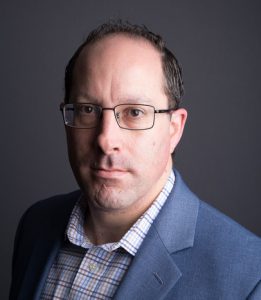
Michael Grabell covers economic issues, labor, immigration and trade for ProPublica. He has reported on the ground from more than 30 states, as well as some of the remotest villages in Alaska and Guatemala. His stories about the dangers faced by temp workers and the dismantling of workers’ comp have won several awards, including the Gerald Loeb Award for business journalism and an IRE Medal for investigative reporting. He is a three-time finalist for the Livingston Award for Young Journalists.
Why we did this story:
For years, we’d been hearing about how companies use immigration status to get rid of
undocumented workers when they get injured, fight for stolen wages or try to form a union.
We wanted to show how this works beyond just allegations against fly-by-night contractors,
how it becomes a way of doing business and how federal and state laws actually encourage it.
In doing some initial reporting, Michael heard many tips about a chicken company that had long
recruited Guatemalan immigrants and had stifled several attempts by workers pushing for better
conditions. He also got some key documents related to a story he and Howard had started looking
into two years earlier as part of a project on workers’ comp. Together, they obtained data from
Florida and tracked down documents from more than 1,000 court cases, showing how insurance companies
were using a state law to get injured immigrant workers arrested, and in some cases deported.
Sold for Parts
They Got Hurt at Work – Then They Got Deported
Who Would Pay $26,000 to Work in a Chicken Plant?
The Secession Movement in Education, Emmanuel Felton
The Nation in partnership with the Hechinger Report
A groundbreaking story about how officials in Jefferson County, Alabama have created six new school districts that hoard resources for white children at the expense of black and Hispanic children—exposing the federal government’s retreat from the principle of school integration that Brown vs. Board of Education heralded.

Emmanuel Felton is a staff writer at the Hechinger Report, a nonprofit newsroom that covers inequality and innovation in education. He reports on – and helps oversee the organization’s coverage of – racial disparities in education. He has written for a number of web and print outlets including The Nation, The Atlantic and Pacific Standard. A native of New Orleans, Emmanuel earned his undergraduate degree from Emory University, before earning a Masters Degree in Journalism at Columbia University.
Why I wrote the story:
School segregation has received renewed interest among education reporters, but the coverage
has not examined the role of the federal government in allowing the re- segregation of American
schools. At the time we began our investigation in 2016, the Obama administration had revived an
old desegregation case in Cleveland, Mississippi. We wondered whether the Justice Department and
courts had been just as active elsewhere. After a year of data analysis and reporting, we learned
the opposite was true. In many cases, the federal government under several presidential administrations
had stood by as districts flouted their legal obligations and allowed segregated schools to flourish.
Sold Short, Lisa Riordan Seville and Lukas Vrbka
BuzzFeed News
Examines how discrimination in housing is at the root of the housing boom in gentrifying Brooklyn neighborhoods. The authors take on the journalistic challenge of contextualizing the experiences of a star broker from the cable TV show Million Dollar Listing NY, eager white homebuyers, and the African American and Latino homeowners pushed out of the communities they created.

Lisa Riordan Seville
is an independent writer and producer in Brooklyn, New York. Her reporting has appeared
on NBC News, WNYC Public Radio, Buzzfeed News, The Guardian, The Nation and VICE, among
other outlets. Her work has been supported by the Investigative Fund for The Nation
Institute, the Open Society Foundations, California Endowment Health Journalism Fellowships
and the Urban Reporting Grants Program from the CUNY Graduate School of Journalism, her alma mater.

Lukas Vrbka is a reporter and researcher based in New York City. Previously on staff at the Schuster Institute for Investigative Journalism, his reporting has appeared in BuzzFeed News and City Limits and has been supported by the Urban Reporting Grant program at the CUNY Graduate School of Journalism.
Why we wrote this story:
It’s no secret that the fabric of New York is changing fast. In Brooklyn in particular,
soaring real estate prices, new shops and new people have fired up heated debates about
gentrification. Yet the step-by-step process of how neighborhoods change is often invisible.
We wanted to better understand how it worked–as reporters, but also as two white residents of
Brooklyn who are part of that shift. We began by taking a close look at a group of Brooklyn
houses that had shot up in value in less than a year. We found a pattern that surprised us:
nearly all of the properties had recently been owned by residents of color on the verge of
foreclosure. As we dove into court documents and property records, we realized that a story
we had thought of as uniquely of the moment was in fact just the latest chapter in a largely
overlooked history of race and homeownership that has been unfolding in this city, and this
country, for decades.
Black Births Matter, Zoe Carpenter and Dani McClain
The Nation
Black infants in the U.S. are twice as likely as white infants to die before their first birthday. The writers document how it is racism rather than race fueling this national health crisis. In a personal meditation McClain reflects on her own experiences as she fights for a healthy pregnancy and on what it is about the American experience that “tears at the black body.”

Zoe Carpenter
is an editor and reporter for The Nation. Her writing on public health,
environmental issues, politics, and culture has also appeared in Rolling Stone,
Narratively, and Guernica. She lives in Washington D.C.
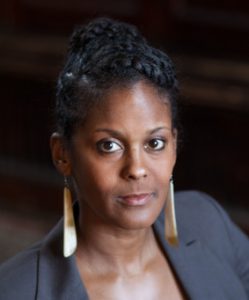
Dani McClain writes and reports on race, reproductive health and activism. She is a contributing writer at The Nation and a fellow with The Nation Institute. Her feature reporting has received awards from the National Association of Black Journalists, the National Lesbian & Gay Journalists Association and the Planned Parenthood Federation of America. McClain has a master’s degree from Columbia’s journalism school and reported on education while on staff at the Milwaukee Journal Sentinel. She is working on a book about black motherhood with Nation Books.
Why we wrote this story:
Many people think about health as a consequence of individual choices—what you eat, how much
exercise you get, whether you smoke or drink. But when it comes to infant and maternal mortality
rates in the United States, individual actions don’t explain the persistence of a wide racial gap.
We wanted to understand why black women and babies are so much more likely to die in the United
States than their white counterparts. Ultimately our aim was to illuminate the growing body of
research pointing to stress and racism, rather than race itself, as a defining factor.
As a reproductive health reporter, McClain knew the bleak maternal health statistics. But it took being pregnant herself to drive home the risks black women face in trying to safely bring their children into the world. Her own efforts to navigate health challenges and find culturally competent birth support became an useful narrative device to show how chronic stress and implicit bias on the part of health professionals can lead to poor health outcomes for black women and infants. For Carpenter, Milwaukee—one of the most segregated cities in America—presented a striking example of the impact of institutional racism on infant mortality rates, and of how difficult it is for elected officials and advocates to reverse the trend.
What’s Killing Black Infants
What It’s Like To Be Black and Pregnant
Falling Off the Cliff, Ronnie Polaneczky
Philadelphia Media Network
A beautifully written and heart-wrenching series about the plight of adults with intellectual and developmental disabilities and their families, documenting difficulties parents face in getting quality care for their offspring, from underpaid and underperforming caregivers to the enormous problems of how to plan for the death of aging parents.
Columnist Ronnie Polaneczky offers a front-steps perspective on every aspect of Philadelphia life – as a long-time city resident, public-school parent, loyal fan of the city’s sports teams, proud supporter of the city’s diverse cultural institutions and vocal critic of the powers that be. As winner of the 2015 Eugene C. Pulliam Fellowship for Editorial Writing, she dug deep into the lives of intellectually disabled adults and their aging parents. The result of her research is “Falling Off the Cliff,” a four-part series published in December 2017.

Columnist Ronnie Polaneczky offers a front-steps perspective on every aspect of Philadelphia life – as a long-time city resident, public-school parent, loyal fan of the city’s sports teams, proud supporter of the city’s diverse cultural institutions and vocal critic of the powers that be. As winner of the 2015 Eugene C. Pulliam Fellowship for Editorial Writing, she dug deep into the lives of intellectually disabled adults and their aging parents. The result of her research is “Falling Off the Cliff,” a four-part series published in December 2017.
Why I wrote the story:
I wrote this series because I was stunned to learn that, as children with intellectual and
developmental adults age into adulthood and well beyond, they become almost invisible to the
greater population. I learned this after writing about a severely intellectually disabled adult
named Christina, whose death by neglect from her state-paid caretaker, was utterly ignored by
local law and social-services agencies. After my story about Christina was published (it was
called “The Death No One Cares About”), countless parents reached out to share their own horror
stories about caregiver abuse and agency incompetence. About political and public indifference to
the needs of intellectually disabled adults. And about the lack of compassion and resources for
elderly parents who have become too old and frail to care for their aging, impaired children.
I felt compelled to tell the stories of these invisible men and women and their families. The result is “Falling Off the Cliff,” a four-part series that looks at what happens to profoundly disabled children as they grow into adulthood – and how their aging families fret over what will happen to these always vulnerable children once they themselves are gone.
Cartooning with a Conscience Award
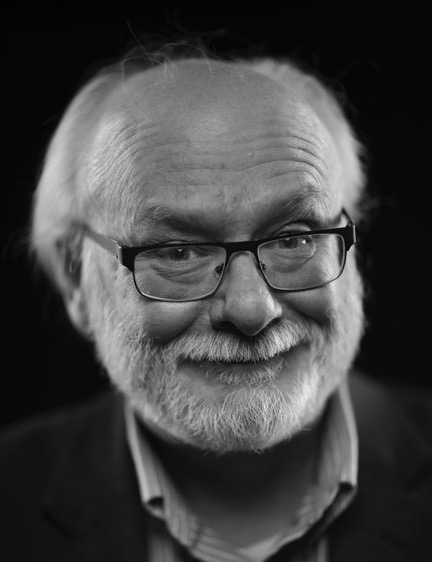
Steve Sack
offers a front-steps perspective on every aspect of Philadelphia life – as a
long-time city resident, public-school parent, loyal fan of the city’s sports teams,
proud supporter of the city’s diverse cultural institutions and vocal critic of the
powers that be. As winner of the 2015 Eugene C. Pulliam Fellowship for Editorial
Writing, she dug deep into the lives of intellectually disabled adults and their
aging parents. The result of her research is “Falling Off the Cliff,” a four-part
series published in December 2017.
IMA Documentary Winner
Dori Cohen - Freelance Nation
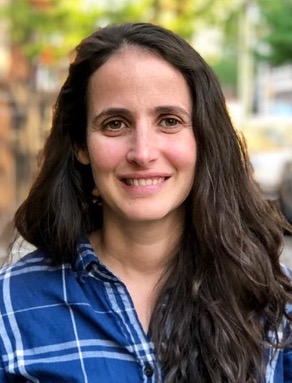
“No Shifts, No Boss, No Limits” reads a giant billboard in one of the main transportation
hubs of NYC. From adjunct professors to taxi drivers, many people are finding themselves
outside of the traditional employment model, with no benefits and little job security.
This transformation is further exasperated by technological developments and the rise of the
“gig economy.” Freelance Nation explores the other side of the popular “sharing economies”
from the perspective of Uber drivers as they struggle to organize for workers’ rights being
eroded under the guise of freedom and opportunity.
Dori Cohen is a documentary filmmaker and MFA student at Hunter College Integrated Media Arts program. She is the co-founder of Framing The Cause Pictures, a production company that partners with organizations to tell stories that strengthen social justice initiatives.
Why this film:
Uber, and others apps like it, are often hailed as great disrupters, which have drastically
altered established industries. However, these disruptions come at a cost. Although they are
convenient and often cheaper, someone is paying the price. I thought it was important to look
at these popular new technologies from the employees perspective. Uber is just one example of
a general trend toward freelance work, where employees don’t get benefits and have little security.
Companies are taking advantage of a loophole in the law and my intention in making this film
was to shed light on that. I made this film because I know of many people across industries,
including myself, who are dealing with this problem.
Undergraduate Student Journalism Award

Nicholas Augustine
A Hunter College senior, Roosevelt Scholar and Media Studies/Journalism and Political
Science major, Augustine covered the South Bronx neighborhoods of Longwood and Hunts
Point as a reporter at the Hunts Point Express. While there, he reported on the governor’s
plans for the Hunts Point Market and the failures of “Vision Zero” for poor communities like
Hunts Point, among other stories.
2017
Gary Younge, Keynote and Outstanding Career Achievement Award

Gary Younge
Whether writing in lucid prose about the deferred dream of Barack Obama,
his own identity as a black Briton in a predominantly white society, or
the prevalence of guns and violence in American life, Gary Younge’s award-winning
work has been probing, illuminating and insightful. An editor-at-large for The Guardian,
Younge has received numerous awards, including the David Nyhan Prize from Harvard University,
and was an Alfred Knobler Fellow at the Nation Institution.
Social Justice Journalism Awards
Busted, Ryan Gabrielson and Topher Sanders
ProPublica, co-published with The New York Times Magazine

Ryan Gabrielson is a reporter for ProPublica covering the U.S. justice system. Previously, his stories for the Center for Investigative Reporting on violent crimes at California’s board-and-care institutions for the developmentally disabled were a finalist for the Pulitzer Prize for Public Service. In 2009, as a reporter at the East Valley Tribune in Mesa, Ariz., he and colleague Paul Giblin won a Pulitzer Prize for stories that exposed how immigration enforcement by the Maricopa County Sheriff’s Office undermined investigations and emergency response.

Topher Sanders covers racial inequality for ProPublica. Prior to joining ProPublica in 2015, he reported on education, city government and criminal justice for The Florida Times-Union. His data-driven reporting on juvenile plea deals and the time Jacksonville juveniles spend in pre-trial detention facilities was a finalist for an Investigative Reporters and Editors award in 2015. His reporting on questionable behavior by Jacksonville’s elected public defender prompted Florida Gov. Rick Scott to order an investigation of the office in 2013.
Why we did this project:
The reporting began as a search for stories that would illuminate the plea deals that dominate
our criminal justice system, to explore what role evidence plays in the courts when more than
90 percent of convictions come by guilty plea. We were checking the National Registry of
Exonerations regularly, which includes very few plea deal cases. But suddenly, by mid-2015,
that was changing. Dozens of overturned drug convictions out of Texas joined the database.
Reading through the case summaries, it seemed to us the unifying characteristic was inaccurate
police field tests. Again and again, innocent people pleaded guilty with only the officers’
results as evidence identifying illegal drugs.
Nuisance Abatement, Sarah Ryley
The New York Daily News and ProPublica

Sarah Ryley is a staff writer at The Trace covering gun violence and a John Jay/ Harry Frank Guggenheim criminal justice reporting fellow. Previously, she was an investigative reporter at The New York Daily News, where she primarily covered policing and the intersection of civil and criminal law. Her work at The New York Daily News triggered numerous reforms, including the passage of the Criminal Justice Reform Act and the Nuisance Abatement Fairness Act.
Why I did this project:
I came across a lawsuit that mentioned that the city tried to evict a woman from her home
based on criminal charges that were dismissed because the lab test came back negative for
narcotics. I was shocked that an entire family could be rendered temporarily homeless, and
a son banned from his mother’s home for life, over such flimsy allegations. I wanted to
see if this was systemic or an anomaly.
Sacred Water: Environmental Justice in Indian Country, Brian Bienkowski
Environmental Health News
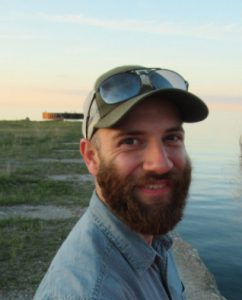
Brian Bienkowski serves as editor of Environmental Health News and its sister site, The Daily Climate. He reports on the intersection of the environment and human/wildlife health, including environmental justice, endocrine disruption, and climate change and water quality. Bienkowski holds a master’s degree in environmental journalism and a bachelor’s degree in marketing from Michigan State University. He lives with his girlfriend, Dani, and their five (!) four-legged friends in Michigan’s Upper Peninsula.
Why I did this project:
I was gathering data for a story on the Crow Reservation’s water quality and realized their
fight for clean water all too common and that tribes across the country are locked in struggle
to protect their water, their environment, and their future. Dwindling or contaminated water
not only sickens tribes but also taints traditions and squeezes spiritual connections to a
breaking point. These are stories of environmental injustice and they needed to be told.
Bordering on Insecurity, Texas Tribune Staff
About The Texas Tribune:
The Texas Tribune is the only member-supported, digital-first, nonpartisan media organization
that informs Texans — and engages with them — about public policy, politics, government and
statewide issues. The Texas Tribune and its destination website were launched in November 2009,
thanks to $4 million in private contributions as seed funding, a small band of talented computer
programmers and some of the most accomplished journalists in the state. Now with a staff of
nearly 50 dedicated reporters, editors, technologists, designers and business leaders, the
Tribune has continued to advance its mission of bringing greater transparency and accountability
to public policy, politics and government through news, data and events.
Why we did this project:
From the time Donald Trump announced his run for the White House until the brash billionaire
prepared to take the oath of office late last year, a team of reporters at The Texas Tribune
went deep on the issues that would fuel his rise more than any other: border security and
immigration. Over the course of the yearlong project, the Tribune traveled to violence-torn
Central America, to the most heavily crossed patch of the U.S.-Mexico border, and to the
U.S. worksites where so many immigrants find low-paying jobs and exploitation. All our
stories had something in common: They were about people caught up in a giant international
smuggling ecosystem that’s being constantly nourished by the insatiable U.S. demand for
illegal drugs and undocumented laborers.
Receiving the award on behalf of the 50 reporters involved in this series:
Jay Root
is a native of Liberty. He never knew any reporters growing up and has never taken a journalism
class in his life. But somehow he got hooked on the news business. It all started when Root
walked into the offices of The Daily Texan, his college newspaper, during his last year at
the University of Texas in 1987. He couldn’t resist the draw: it was the biggest collection of
misfits ever assembled. After graduating, he took a job at a Houston chemical company and soon
realized it wasn’t for him. Root applied for an unpaid internship at the Houston Post in 1990,
and it turned into a full-time job that same year. He has been a reporter ever since. Root has
covered natural disasters, live music and Texas politics — not necessarily in that order. He
was Austin bureau chief of the Fort Worth Star-Telegram for a dozen years, most of them good.
He also covered politics and the Legislature for The Associated Press before joining the staff
of the Tribune. Root is the author of Oops! A Diary From The 2012 Campaign Trail, an insider’s
account of Texas Gov. Rick Perry’s dramatic collapse in the 2012 presidential race.
The Crisis Within, How Toxic Stress and Trauma Endanger Our Children, Nancy Cambria, Photos and video by Laura Skrivan
St Louis Post-Dispatch

Nancy Cambria
joined the staff of the St. Louis Post-Dispatch in Sept. 2005. Cambria was the runner up for
the Annie E. Casey Medal for Meritorious Journalism, in 2012, for her special report on the high
rate of child deaths in unlicensed and illegal day cares in Missouri. A New Jersey native who
grew up in Montclair, Cambria graduated from Skidmore College and received a master’s in creative
writing from Ohio University, Athens.

Laurie Skrivan has worked at the St. Louis Post-Dispatch since 1997. A St. Louis native and graduate of the University of Missouri School of Journalism, she was part of the team that won a Pulitzer Prize in 2015 for covering the unrest in Ferguson. Her work has been recognized by Pictures of the Year International and by the National Press Photographers Association.
Why we did this project:
Nancy Cambria and Laurie Skrivan were among more than two dozen reporters and photographers at the
St. Louis Post-Dispatch sent to cover the continuing protests and unrest in the aftermath of
the fatal shooting of Michael Brown by a Ferguson Police officer. Cambria, the newspaper’s
children and families reporter, was struck by the number of toddlers and young children she saw
on the often volatile protest lines. Skrivan was interested in documenting the daily lives of
families living within yards of the protests and a highly militarized police presence. Cambria
decided to explore the issue of trauma and toxic stress more deeply in the community after she
had discussions with therapists at a nearby Red Cross emergency drop-in center. They told her
residents weren’t just traumatized by Brown’s death and the ensuing unrest. They were also
re-living past trauma from growing up and living in impoverished, often violent neighborhoods.
With the help of a National Center for Health Journalism fellowship, Cambria learned about brain development and “toxic stress” and its relationship to poverty and poor adult health outcomes. Not long after Skrivan and Cambria formally began their reporting in the neighborhood for the project, Jamyla Bolden, 8, was fatally shot through a window while doing her homework. Jamyla lived just blocks away from where Brown was killed a year earlier. Cambria and Skrivan followed children and families who knew Jamyla for seven months to create their special report.
Gayborhood Racism: Covering Acts of Racial Discrimination in Philadelphia’s LGBTQ Community, Ernest Owens
Philadelphia Magazine

Originally from Chicago, Ernest Owens is an award-winning multimedia journalist and editor of G Philly for Philadelphia Magazine. Owens, 25, has reported on a range of social issues connected to race, LGBTQ, politics, and pop culture. His work has been featured in USA Today, BET, The Huffington Post, The Advocate and many other national publications. The University of Pennsylvania alum currently serves as the board treasurer of the nation’s oldest press club, The Pen & Pencil Club, and as board secretary of Philadelphia Community Access Media.
Why I did this project:
Investigating the decades-long issue of racism in Philadelphia’s LGBTQ community was simultaneously
a personal and professional liberation. Being an openly black gay man who have seen how the
intersectionality between race and sexual orientation isn’t always as harmonious as one imagines, reporting
on the diverse activists who pushed forward their demands for a more inclusive community reinforced why I
chose to enter this field in the first place.
Cartooning with a Conscience Award

Pat Bagley
The editorial cartoonist for The Salt Lake Tribune for 38 years, Bagley is a popular commentator
on the comic politics of Red State Utah. One of the most reprinted syndicated cartoonists with
politicalcartoons.com, Bagley has won prestigious cartooning awards, including the 2009 Herblock
Award, co-winner of the prestigious Prix de l’humor Vache in France, and was a finalist for the
2014 Pulitzer Prize.
Statement
I remember learning about politics from editorial cartoons when they helped me puzzle out what
Nixon was up to and what Watergate was all about. They were my Rosetta Stone to the world of
politics. I can easily imagine some girl or boy today furrowing their forehead over a cartoon
done by me, or by one of my colleagues. I can also see a light suddenly going on and the gift
that was given to me is passed to another generation.
IMA Documentary Winner
Betty Yu for her film THREE TOURS

THREE TOURS, produced and directed by Betty Yu, is a documentary that captures the lives of
three U.S. military veterans, Nicole Goodwin, Ramon Mejia and Ryan Holleran, as they work to
heal their wounds and battle with PTSD resulting from their deployments in Iraq. The film follows
their transformation from U.S. military trained soldiers to agents of change advocating for
proper mental health treatment of veterans and an end to unjust wars.
Betty Yu graduated from the IMA MFA Hunter College program in 2016. She is a Chinese-American interdisciplinary, multi-media artist, educator and community activist. Her documentary and multi-media work is shaped and influenced by her direct experience as a daughter raised by garment worker parents who toiled in sweatshops after arriving from Hong Kong over 37 years ago. This upbringing undoubtedly frames who she is as an artist today. In her artwork she approaches social issues through personal story, family narrative and community history. Her work explores issues ranging from labor rights, immigrant justice, and gender equity to militarism.

Betty Yu graduated from the IMA MFA Hunter College program in 2016. She is a Chinese-American interdisciplinary, multi-media artist, educator and community activist. Her documentary and multi-media work is shaped and influenced by her direct experience as a daughter raised by garment worker parents who toiled in sweatshops after arriving from Hong Kong over 37 years ago. This upbringing undoubtedly frames who she is as an artist today. In her artwork she approaches social issues through personal story, family narrative and community history. Her work explores issues
2016
Social Justice Journalism Awards
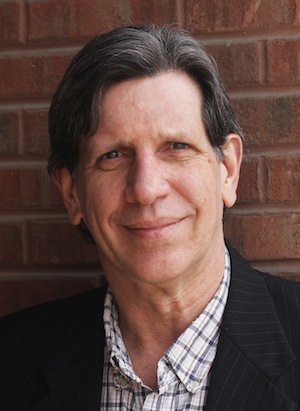
Curt Guyette, Keynote Speaker, ACLU Investigative Reporter
For original reporting and collaboration with community groups on
the poisoning of Flint residents by lead-contaminated water,
a crisis created by Michigan’s emergency management system.
Raquel Rutledge, Gasping for Action, Milwaukee Journal Sentinel
Uncovering how workers who roast and grind coffee are exposed to the
lung-destroying chemical diacetyl, which is also used in the $1.5
billion e-cigarette business.
Esther Kaplan, The Spy Who Fired Me, The Human Cost of Workplace Monitoring, Harpers
Exposing how in industry after industry, data collection is
part of an expensive, high-tech effort to squeeze every last drop
of productivity from workers.
Beth Schwartzapfel, Life Without Parole, The Marshall Project
A series of articles taking us into the secret world of parole boards,
revealing how politically appointed board members make decisions without
transparency or accountability.
Jon Swaine, Oliver Laughland, Jamiles Lartey and Ciara McCarthy, The Counted, The Guardian US
This interactive database is the most thorough public accounting of the
deathly use of force by US police enforcement, now used by the Dept of Justice.
Kevin Sawyer, Award for Exemplary Community Journalism, San Quentin News
From inside the prison walls of San Quentin, Sawyer serves to inform the incarcerated,
tell their stories, and highlight social justice issues.
Khalil Bendib, OtherWords, Grambs Aronson Cartooning with a Conscience Award
With profound wit, Bendib’s pen-and-ink cartoons comment on racial injustice,
labor and class struggles, and the scapegoating of Muslims and Arabs.
Undergraduate Award for Journalism
Ajhani Ayres, Watching The Block: Three women look back – and ahead on Kelly Street, Hunts Point Express
Through the lens of one family over four decades on Kelly Street in the Bronx,
Ayres makes the case that what makes neighborhoods strong is the commitment of its residents.
IMA MFA Graduate Student Awards
Melissa Saucedo Gonzalez, BEFORE DAVID, Documentary short
Gonzalez uncovers a mental heath issue rarely spoken about — prenatal depression,
and the difficulties experienced when confronting changes in one’s body,
lifestyle, identity and belief systems.
Samantha Farinella, HUNTING IN WARTIME, Documentary feature
Tlingit Vietnam War veterans from Hoonah, Alaska, talk about surviving trauma,
relating to Vietnamese civilians, readjusting to civilian life, and
serving a government that systematically oppresses native people.
2015
Career Achievement Award
William Greider
A career spanning more than 40 years, tirelessly exposed the problems in our
nation’s economic and political systems, first as a reporter for such regional
newspapers as the Louisville Times and the Courier-Journal, then as a correspondent
and editor for The Washington Post, then as a national correspondent and political
columnist at Rolling Stone magazine for 17 years, and finally, since 1999, as the
national affairs correspondent for The Nation.
Social Justice Journalism Awards
Jessica Bruder — The End of Retirement
In this evocative, powerful story about the elderly Americans who staff Amazon’s massive
warehouses in the American West, Jessica Bruder investigates a little-discussed segment of
the working poor: people who worked for decades only to have little to nothing on which to
retire.
Sari Horwitz — Justice In Indian Country — Washington Post
Part I, Part II,
Part III, Part IV,
Part V, Part VI
Jonathan Jones and T. Christian Miller — Firestone and the Warlord (Part 1, Part 2) — ProPublica
In this collaborative effort between ProPublica and Frontline, the journalists Jonathan
Jones and T. Christian Miller take us deep into the tentacles of corruption that allowed
an iconic American company Firestone to enrich itself while aiding Charles Taylor, a
notoriously brutal Liberian warlord, who would eventually land in prison for war crimes.
Andrea McDaniels — “Collateral Damage — Baltimore Sun”
Liz Szabo, Kevin Johnson, Rick Jervis, Gregg Zoroya, Rick Hampson and Larry Copeland —
The Cost of Not Caring — USA Today
USA Today pulled out all the stops to examine the myriad ways in which failing to treat the
mentally ill leads to systemic problems that affect American society as a whole. A
joint-effort by multiple reporters, the series considers such wide-ranging topics as suicide,
mass shootings, homelessness, and substance abuse. Rather than merely exposing the problem,
“The Cost of Not Caring” also addresses potential solutions.
Series overview: Nowhere to Go; Shootings spur call for change;
Stigma; Jail;
Homelessness; Unemployment;
Suicide; Family; Substance abuse; Solutions;Early intervention
Cartooning With a Conscience Award
Adam Zyglis, The Buffalo News
For more than a decade Adam Zyglis has created graphically sophisticated, hard-hitting political
cartoons for The Buffalo News. His work tackles everything from domestic violence to income
inequality and racism with a unique style and a pitch-perfect sense of the zeitgeist.
IMA MFA Documentary Winners
Nathan Fitch, Mikros Soldier
Micronesian Pacific Islanders are not US citizens, yet they enroll in the US military
– and die – at disproportionately high rates. Mikros Soldier explores the complex relationship
between the U.S. and Micronesia, and follows two young men as they leave their tranquil island
homes, go through basic training, and head to Afghanistan.
Sam Feder, Kate Bornstein is a Queer & Pleasant Danger
In this uplifting and timely documentary, Sam Feder profiles the brave, pioneering transgender
performance artist and activist Kate Bornstein, who underwent sex-reassignment surgery in 1986
at age 38, to address the importance of being true to oneself while considering, more broadly,
what it means to lead a fulfilling life.
Undergraduate Award for Social Justice Journalism
Iyeisha Heart — Hunts Point Express
Founded in 2006, The Hunts Point Express is a source of neighborhood news for the Hunts Point
and Longwood neighborhoods of the Bronx. Its aim is to air information, connect residents
and give them a voice. Produced by students in the Film & Media Department at Hunter College,
The Express is updated regularly with stories about the people of the Hunts Point-Longwood
community and the issues they care about, from jobs and housing to education and the environment.
Press
Letter from Film Commissioner (pdf)
— From The City of New York Mayor’s Office of Media and Entertainment
Another Glimmer of Hope That the Veil of Silence Is Lifting
— The Huffington Post
Buffalo News cartoonist Adam Zyglis humbled by Aronson, Headliner awards week
— The Washington Post
2014
Career Achievement Award
David Carr earned a Career Achievement Award, writing for The New York Times, highlighting social justice issues lurking in the modern world’s rapid embrace of media and information technology, such as the lack of nuance in cable TV’s discussion of race and the Internet’s accelerated “gerrymandering” of media and consumers into “gated communities”.
Social Justice Journalism Awards
Andrea Elliott writing for The New York Times, for Invisible Child, a five part series chronicling a year in the life of a homeless 11-year-old girl that illuminates how city policies reinforce a cycle of inescapable poverty.
Chris Hamby of the Center for Public Integrity, for Breathless and Burdened, a yearlong investigation that examined how doctors and lawyers working at the behest of the coal industry, have helped defeat the benefits claims o miners sick and dying of black lung, even as disease rates are on the rise.
Terrence Mccoy writing for Miami New Times, for Home Invasion, a story that uncovers how an American millionaire has poured at least $85 million into building contested Israeli settlements and ultimately undermining the possibility of a lasting peace for Israelis and Palestinians.
Ted Genoways of OnEarth for End of the Line, an expose of how the oil industry wreaks havoc on the environment and the health of a predominantly poor, African American community in the Carver Terrace neighborhood of Port Arthur, TX.
Alexander Mallis an IMA/MFA student of Hunter College, produced, After Trayvon, a short documentary featuring a group of young men who discuss issues such as the death of Trayvon Martin, stop and frisk, and daily life.
The Undergraduate Student Journalism Award
Angely Mercado, Hunts Point Express
For exposing the struggles of residents against landlords,
management companies, and private equity groups that prioritize profit
at the cost of safe and sanitary living conditions in the Hunts Point area of the Bronx.
Cartooning with a Conscience Award
Clay Bennett, Cartooning With a Conscience award
2013
Social Justice Journalism Awards
David Jackson, Gary Marx and Alex Richards of The Chicago Tribune, for An Empty-Desk Epidemic, an article exposing why tens of thousands of Chicago children go missing from school every day.
David Heath and Jill Rosenbaum from the Center for Public Integrity, for Dollars and Dentists, an article that exposes how private equity firms push chains of dental clinics to yank excess profits from the mouths of babes and uninsured adults.
Lisa Song, Elizabeth McGowan and David Hasemyer writing for Inside Climate News, for The Dilbit Disaster: Inside The Biggest Oil Spill You’ve Never Heard Of, a cautionary tale examining the environmental and human costs of the “the dirtiest, stickiest oil on the market.”
Shane Bauer of Mother Jones, for No Way Out, a powerful exposé of the use of indefinite solitary confinement in American prisons, told from the perspective of Bauer, who himself was held in solitary confinement in Iran after his arrest while hiking near the Iran-Iraq border.
Ta-Nehisi Coates writing for The Atlantic, for Fear of a Black President, a special commentary award on how fear and double standards make a meaningful public conversation about race more elusive than ever in the age of Obama.
Cartooning with a Conscious Award
Signe Wilkinson, Cartooning With a Conscience award
2012
Lifetime Achievement Award
John Nichols of The Nation for career achievement as journalist, author and blogger tracking threats to democracy across politics and media.
Social Justice Journalism Awards
The Center For Public Integrity and iWatchnews.org for wide-ranging investigation of weak inspections endangering factory workers and surrounding communities.
The Sarasota Herald-Tribune “Unfit for Duty,” an exposé of systematic failure to discipline police officers despite arrests or evidence of crimes.
Danny Hakim and Russ Buettner of The New York Times for “Abused and Used,” a probing and poignant exposé of rampant neglect and mistreatment of the developmentally disabled in New York state institutions.
Lea Goldman of Marie Claire for revealing widespread fraud in “pink”-themed fundraising for cancer research and awareness.
Cartooning With a Conscience Award
Cartooning With a Conscience award to “Mr. Fish” (Dwayne Booth)
2011
Social Justice Journalism Awards
Wayne Barrett for some 40 years of investigative journalism holding New York politicians to public account.
Jane Mayer of The New Yorker for being among the first journalists to delineate the pervasive and obscure public influence of the Koch brothers’ enormous wealth.
Village Voice Media for deploying reporters from across its 14-paper alternative weekly chain to tell vivid tales of the travails and contributions of Latinos “Amongst U.S.“ their work counters nativist fear-mongering and opens space for a coherent immigration policy.
Jan Goodwin of the Schuster Institute for Investigative Journalism at Brandeis University and The Ladies’ Home Journal for telling the harrowing story of a Sierra Leonean woman’s flight from female genital mutilation to the US, where she found fresh injustice instead of asylum.
Cartooning with a Conscience Award
Gary Varvel, cartoonist of the Indianapolis Star, has been named 2010 winner of the Grambs Aronson Award for Cartooning With a Conscience.
Varvel’s ambitious project, “The Path to Hope,” impressed the judges for its sensitive registration of the everyday burdens that weigh down the poor. Varvel’s artistic technique, combining photoshopped still images for backgrounds and pen and ink for characters, also won plaudits. Small touches lent realism and depth to cartooned faces.
Varvel registers the everyday hardships faced by the poor — illiteracy, transportation, lack of access to healthy food, domestic and neighborhood violence –with a level of empathetic detail rare even in print news accounts. Homing in on the inefficiently laid out Indianapolis bus system, Varvel writes, “Working the third shift can mean up to an hour-long commute late at night and back home early in the morning, hoping to arrive in time to get the children off to school.”
2010
Social Justice Journalism Awards
A.C. Thompson for exposing “Katrina’s Hidden Race War” in The Nation. Thompson’s two-part investigation in The Nation revealed how white residents of New Orleans’s Algiers Point neighborhood in the wake of Hurricane Katrina formed an ad hoc militia. As black residents fled the rising flood waters in search of help and refuge, many were shot, attacked or forced back into the storm.
At the time the two-part series appeared, none of these attacks and killings had ever been investigated. Conducting dozens of interviews with survivors, historians, eyewitnesses, firefighters, forensic pathologists and self-described vigilantes and poring over more than 800 autopsy reports, Thompson was able to document 11 shootings, including several possible murders. His reporting, supported by The Nation Institute’s Investigative Fund, ProPublica, the Center for Investigative Reporting and New American Media, resulted in two grand jury investigations and critical reforms in the New Orleans Police Department.
JoAnn Wypijewski for a career distinguished by original reporting on the interweaving of social and sexual affairs. Through in-depth features for Harper’s, Mother Jones, Legal Affairs, Counterpunch and most recently in her column “Carnal Knowledge” in The Nation, Wypijewski shreds the clichés that structure typical media narratives and “common sense.”
In the late 1990s, she visited two towns projected into the national spotlight by sensational cases involving sex and managed to tell a more penetrating, nuanced story about them than had any other journalist.
In Jamestown, New York, for instance, a 21-year-old black man named Nushawn Williams had been accused of having sex with dozens of teenaged girls — most of them white — and of infecting 13 of them with HIV. The prevailing narrative demonized him as an HIV predator and sexual scorekeeper. For the story called, “The Secret Sharer” Wypijewski went to Jamestown. Without denying Williams’ agency, she asked herself what needs Williams had filled in the lives of the young women there. Her detailed account intimately reconstructed the constraints on life (and love) chances for women and men in a town suffering progressive deindustrialization.
Wypijewski accomplished similar exercises in extraordinary contextualization in pieces on the murder of 21-year-old Matthew Shepard, who was beaten, stripped, and left to die tied to a fence outside Laramie, Wyoming and the conviction of Paul Shanley, a defrocked priest convicted of sexual abuse on the basis of “recovered memory.”
A piece on Notes on a Scandal the New York Governor Elliot Spitzer challenges conventional wisdom by suggesting that he and his wife may actually have had the happy marriage they claimed they did and that the infamous prostitute, “Kristen,” may have played an important role in maintaining it. Articulating a moral realism and nuance that journalistic discourse rarely permits itself, she writes, “sometimes you don’t get from your husband or wife everything that you need. . . . That [Spitzer] himself had scant generosity toward others who are drawn to the forbidden, need not compel us all to be prosecutors.”
Wypijewski’s ability to see beyond individual “choice,” narrow good and evil and typical “root causes,” enriches the very conception of social justice journalism.
Mother Jones Magazine for comprehensive, vivid coverage of climate change in The Climate Countdown a special of issue of Mother Jones, writers spanned the globe, weighing the present-day, human costs of the swiftly warming planet and analyzing obstacles to mitigation. Destinations included the Pacific island nation of Tuvalu, whose residents are the world’s first climate refugees; a slice of Brazilian rainforest being used by General Motors to offset its SUV-sized carbon footprint while forcing local people to find somewhere else to live; Alaskan backcountry being flooded by early thaws and California’s once-fertile Central Valley devolving into a 21st-century Dust Bowl. Coverage of the Copenhagen climate talks was enriched through cooperative reporting with eight other journalism organizations so that Mother Jones was able to field a staff of two dozen reporters, columnists and videographers. The magazine’s special issue announces a significant ongoing commitment to expanded reporting on what is arguably the most far-reaching story of our era.
Nina Bernstein of The New York Times for multi-faceted coverage of immigration issues. Bernstein’s ongoing coverage of immigration issues for the New York Times paints a complex picture of people drawn to the American dream and the intricacies of public policy governing their movements. Through her reporting we witness a Burmese refugee’s first sight of snow and learn of a Senegalese boy, left from the age of 14 to fend for himself in New York. His lack of documents is only revealed when his skill in robotics helps to win his team an invitation to fly to a national contest in Atlanta.
At the same time, Bernstein, keeps a steady eye on the machinery of law-enforcement and due process. Tracking the patchwork of more than 500 county jails, profit-making prisons and federal detention centers housing half a million noncitizens, she reports that all too often they fail to work as they should. As her stories unfold, we see secrecy and lack of legal accountability shielding operations from independent oversight. Immigrants have no right to court-appointed lawyers. No central body is mandated to publicly track deaths in custody, nor is any independent inquiry required into such tests. The mentally ill receive scant understanding of the difficulties they face. In short, Nina Bernstein’s thoroughgoing enterprise reporting brings the human and political dimensions of the immigration issue to life.
Cartooning with a Conscience Award
Jen Sorensen: “Slowpoke Comics,” for political satire and popular culture commentary. The work of cartoonist and illustrator Jen Sorensen is noteworthy among alternative weekly graphic artists for branching in two directions. Like many cartoonists, Sorensen satirizes the contemporary political scene. She notes the ironies of Teabagger activists who despise big government but unquestioningly support the president as “unitary executive.” She gives us a character in minute-man hat fuming that there will be hell to pay if “the government usurps my right to crushing medical bills!” Turning to the art of naming political programs (“Name That Plan!”), Sorensen points up a problem with the “public option”– it “sounds like a restroom.” Better to “go macho” with “TOUGHCARE”, promoted by a thug in camo pants and muscle shirt warning that “a strong America needs healthy people!”
But Sorensen also expands the usual pattern by using her strips to parody popular, especially digital, culture. She depicts grandparents of the future, reminiscing to their grandchildren over their Wikipedia page editing battles and the candid videos they posted on YouTube. When the grandchildren criticize them for wasting their lives staring at screens, the elders simply abandon the “virtual front porch” (“with grandkids”) they had been viewing. In another strip, Sorensen envisions a time when nostalgic mobile telephone users carry phone booths on their backs so they can get that “soulful, landline feel” and folks slow life down with “TELEGRAM TWEETS” (e.g. a hand-delivered cable reading, “just captured urine sample from my dog STOP”).
2009
Career Achievement Award
Les Payne is a Pulitzer Prize-winning journalist who worked for 28 years at Newsday as a reporter, foreign correspondent, columnist and associate editor. In 1974, he shared a Pulitzer for his investigative work on the heroin trail from Turkey to the United States. A co-founder and former president of the National Association of Black Journalists, he was inducted into NABJ’s Hall of Fame in 2008. Murray Kempton once described Payne as “a great editor because he is always his own man.” Payne has trained generations of reporters to cover the basics and to dig deeper; his news staffs won every major award in journalism, including six Pulitzer Prizes. His mantra as reporter, editor and columnist has been — “Don’t pull your punches, tell the truth and duck.”
Social Justice Journalism Awards
E.J. Graff: Foreign Policy "The Lie We Love," for exposing the corruption that underlies many international adoptions and highlighting international efforts to deter illegal practices. Graff probes and dissects her subject with a scholarly approach, but presents her findings with an engaging, journalistic sensibility.
Joseph Huff-Hannon, The Independent Facing Foreclosure: Brooklyn Retiree on Verge of Losing Home as Sub-prime Lenders Target Cash-Poor Black Seniors, for a local view of a national crisis.
Nick Turse: The Nation, “A My Lai a Month,” for revealing that the My Lai massacre of 1968 was just one among many during the Vietnam War, and for documenting government efforts to stall investigations and quell media coverage. An Aronson Award will also go to Kevin Buckley, whose original reporting on the issue in the 1970s as Newsweek’s Saigon bureau chief was largely buried, only to be resurrected 30 years later by Nick Turse.
Blog Award
Danny Schechter The Aronson Blog Award goes to veteran journalist, author, television producer and independent filmmaker Danny Schechter for his latest venture, the NewsDissector.org blog, with analyses and muckraking news reports on the economic, political and social crises of the day.This is his website NewsDissector.org.
Cartooning with a Conscience Award
Ed Stein for the graphic sophistication and range of his work in 2008 on the economy, torture and other crucial issues
2008
Social Justice Journalism Awards
Brian Grow, Robert Berner and Keith Epstein: of Business Week for “The Poverty Business,” demonstrating that the sub-prime housing mortgage scandal is just the top of an iceberg as major companies, operating on the notion that “debt is the real product,” pry big profits from poor people.
Jarrett Murphy: of City Limits Investigates for “The Prisoners Dilemma: How NYC’s Bail System Puts Justice on Hold,” an expose of how bail as low as $200 for non-violent crime can confront economically disadvantaged people, who may well be innocent, with cruel choices.
Helen Benedict: writing in Salon.com about "The Private War of Women Soldiers", a sensitively detailed expose of the excruciating existential dilemma of women soldiers in Iraq, threatened, not only by IEDs and car bombs, but by sexual assault from their own comrades and a code of silence that can close the way to justice.
Dahr Jamail: for independent Iraq reporting (DahrJamailIraq.com), closely covering the perspectives and experiences of ordinary Iraquis.
Jeremy Scahill: for reporting on Blackwater Worldwide in The Nation, where he laid bare the killings, human rights violations and other misconduct by the private security company that provides private security for American diplomats in Iraq, a story all the more important when an estimated 40 cents of every dollar spent in the Iraq occupation goes to war contractors.
Matt OBrien and photographer Ray Chavez: for “The Mayan Way” in the Daily Review of Hayward, California, a five-part series bringing to light the “hidden history” of the Kaqchikel Maya’s immigration to Hayward, a multi-dimensional picture as sensitive to the richness of the Mayan homeland and culture as to immigrant struggles in the economic prosperity of the US.
Cartooning with a Conscience Award
Marc Simont: a prize-winning children’s book illustrator, a “Cartoonist with a Conscience” for weekly graphic send-ups of fatcats and falsely pious pols submitted to his local paper, the Lakeville [CT] Journal (circ. 4,771) since the 1950s (Simont is 92.)
2007
Career Achievement Award
Amy Goodman in recognition of a distinguished career, employing multiple media platforms most recently a newspaper column– to bring a clear social justice vision to reporting and investigating the news.
Social Journalism Awards
Julia Whitty of Mother Jones for “The Fate of the Ocean,” a 28-page cover package exposing the grave environmental dangers facing the seven-tenths of the planet covered by the world’s oceans.
Corine Hegland of the National Journalfor “Guantanamo’s Grip,” an investigative report mining the government’s own records to reveal that most of the men weren’t known terrorists, weren’t captured on the battlefield, and weren’t even accused of fighting the United States.
Judy Pasternak of the Los Angeles Timesfor “Blighted Homeland,” a four-part series, bringing into shocking clarity the plight of the Navajo of Utah, Native American victims of the Cold War, whose lands were exploited to build the US nuclear arsenal then largelyabandoned, ravaged and lethally radioactive.
Reporter Tim Collie and photographers Mike Stocker and Jim Amon of the South Florida-Sentinel for “Orphans of AIDS,” a four-part, richly illustrated series examining the plight and resiliency of people facing the AIDS crisis in South Florida and the Caribbean.
Cartooning with a Conscience Award
John Sherffius’ of the Boulder Daily Camera for Cartooning with a Conscience deft, painterly graphics sharpened by mordant irony.
2006
Social Justice Journalism Awards
Columnist Molly Ivins for a career demonstrating that there is no contradiction between passionate social commitment and rollicking humor
Anthony Lewis for commentary long infused with a profound understanding of American history and constitutional law.
Gary Fields of The Wall Street Journal for exposing the unanticipated negative impact on the justice system of 20 years of “get-tough” prison sentencing.
Kevin Fagan and photographer Brant Ward of the San Francisco Chronicle for ongoing coverage of homelessness and measures to end it and Tracie McMillan and City Limits magazine for consistent, rigorous reportage on public affairs affecting low-income and working-class people in New York City.
Acknowledging blogging as a significant extension of journalism, a special award to University of Michigan Professor Juan Cole’s richly informative commentary on the Iraq War in his web log, "Informed Comment."
The awards ceremony featured a keynote introduction by Wayne Barrett, noted Village Voice investigative reporter, and holder of the Jack Newfield Visiting Professor of Journalism at Hunter College for Spring 2006.
Cartooning with a Conscience Award
Freelance cartoonist and illustrator Kirk Anderson for “Cartooning with a Conscience” through his deft graphics that draw on sophisticated political thought to sharply satirize daily political follies.
2005
Social Justice Journalism Awards
Seymour M. Hersh of The New Yorker, for exposing the full culpability in the Abu Ghraib torture scandal.
Naomi Klein for revealing in Harper’s Magazine how the Bush Administration worsened conditions in Iraq by attempting to transform it into a showcase of free-market economics.
Frank Rich of The New York Times for original explorations of the intersections between media culture, values and politics.
Peter G. Gosselin of the Los Angeles Times for economic reporting on an ironic “New Deal,” in which economic risk is shifted steadily from the broad shoulders of business and government to the backs of working families.
Cartooning with a Conscious Award
Bill Day of the Memphis Commercial-Appeal for won recognition for “Cartooning with a Conscience” that expresses powerful sympathies for the oppressed and a skeptical view of the powerful.
2004
Social Justice Journalism Awards
Paul Krugman, for political commentary The New York Times & The Nation that bring issues formerly buried in the business pages to life on the op-ed page.
Jake Bernstein & Dave Mann for “The Rise of the Machine” in The Texas Observer. They showed a Texas political group and political action committee created in part by House majority leader Tom DeLay funneled corporate money to help elect a specific slate of state candidates in the 2002 elections.
John Donnelly, Colin Nickerson, David Filipov and Raja Mishra for “Lives Lost” in The Boston Globe, a series that put human faces on grim World Health Organization statistics showing that 24,000 people die needlessly each day from preventable diseases, infections and childbirth complications.
David Barstow & Lowell Bergman for “Dangerous Business” and “When Workers Die” in The New York Times, in which they documented dangerous conditions at companies that scorn safety regulations in pursuit of profit, leaving thousands of workers toiling in deplorable conditions, thousands of others injured and many dying horrible deaths.
Mohammed Bazzi for In-Depth Coverage of the Iraq Warin Newsday, where his dispatches brought rare depth to coverage of the Iraq War.
Cartooning with a Conscience Award
Mark Fiore for pioneering and advancing development of Animated Political Cartooning on the World Wide Web.
2003
Social Justice Journalism Awards
William Finnegan, The New Yorker, for writing about the privatising of natural resources and economic globalization.
Seth Rosenfeld for the San Francisco Chronicle for detailing FBI harassment of University of California at Berkeley President Clark Kerr.
Rebekah Denn of the Seattle Post-Intelligencer for examining differentials in the way African-American and white students are disciplined in Seattle public schools.
Katy Reckdahl for her series on mistreatment of the homeless in New Orleans in Gambit Weekly.
Cartooning with a Conscious Award
Ted Rall for his caustic satire of such figures as "Generalissimo El Busho," whose answer to unemployment is to fire everyone and label the “formerly employed” as “lazy.”
2002
Social Justice Journalism Awards
William Greider, The Nation, for reporting on the “ regulatory takings ” movement, which threatens environmental regulations by claiming that they impair profit-making.
Dolores Barclay, Todd Lewan and Allen G. Breed, of the Associated Press for “Torn From the Land,” an impressively researched series that brought into vivid, contemporary news stories a long history of African-Americans’ whispered accounts of the loss of the “home place” through threats and legal chicanery.
Lifetime Achievement Awards
Robert Sherrill, a Lifetime Achievement Award to a journalist who for years has expressed a "burning rage at injustice" through clear eyes, a comprehensive intelligence and razor sharp prose.
Edward Sorel, a Lifetime Achievement Award for a pen-and-ink style that has won him acclaim as a contributor to the tradition of draftsmanship marked by Daumier and Goya.
Cartooning with a Conscious Award
Dan Perkins, a.k.a. Tom Tomorrow, “Cartooning with a Conscience” by “the best political cartoonist no one ever heard of.” Working in a sly, post-modern vein, Tomorrow playfully manipulates stock figures to satirize American gullibility, materialism and political absurdity.
2001
Social Justice Journalism Awards
Ellen E. Schultz of the Wall Street Journal for stories revealing how the U.S. government, spurred by over-excited coverage in The New York Times, prosecuted a spy case that unraveled to expose a foundation in racial profiling and antiquated Cold War scenarios.
Juan Gonzalez, whose New York Daily News columns range across American society, weighing national and local events with an eye consistently trained on the perspectives of minorities and working people.
Social Justice Graphics
Steve Brodner, whose cartoons, satirical illustrations and “art journalism” bitingly portray the foibles of the powerful and vividly highlight the voices of ordinary people confronting significant social issues.
2000
Social Justice Journalism Awards
Sasha Abramsky for "When They Get Out" in the Atlantic Monthly on the dire consequences for poor, minority communities of the national mania for incarceration without rehabilitation.
Larry Johnson and Dan DeLong for "Life and Death in Iraq" (Seattle Post-Intelligencer), documenting how sanctions against Iraq take a heavy toll on innocent human life yet fail to produce political results and hurt the U.S. economy.
Marcus Stern, Dana Wilkie, Dori Meinert and Toby Eckert of Copley News Service for “America's Immigration Dilemma,” outlining the economic forces that encourage immigration — cheap labor — then increasingly consign these legal immigrants to impoverished futures.
Lifetime Achievement Awards
Social Justice Graphics: Lifetime Achievement Award to Jules Feiffer and 1999 award to Art Spiegelman for a New Yorker magazine cover satirizing police brutality.
Lifetime Achievement Award to Jules Feiffer and 1999 award to Art Spiegelman for a New Yorker magazine cover satirizing police brutality.
1999
Social Justice Journalism Awards
Newsday for “The Health Divide” on inequities in health care afforded to African-Americans and for “Their Killers Walk Free” on unprosecuted civil-rights-era murders in the Deep South.
Christopher Cook and The Progressive for “Plucking Workers” on the use of welfare reform to channel welfare recipients into jobs notorious for high rates of injury and chronic employee turnover.
Donald L. Barlett and James B. Steele and Time magazines for a series on corporate welfare.
1998
Social Justice Journalism Awards
Commentary: Bob Herbert for columns on police brutality in The New York Times; Environmental Reporting: Karl Grossman articles demonstrating the dangers of the militarization of space.
Socio-Economic Reporting: Marc Kaufman & Dan Stets revealing the mismanagement of a school for fatherless children by the Philadelphia Board of City Trusts, published in the Philadelphia Inquirer.
International Reporting: The Progressive & reporters Eyal Press, Jennifer Washburn, Benn Terrall & Amy Goodman for exposing the efforts of the U.S.-Indonesia Society to marshal support for the Suharto regime, notwithstanding its record of human rights abuses.


